ICMI Newsletter - March 2025
Editors:
Jean-Luc Dorier (ICMI Secretary-General)
Jinfa Cai (ICMI Vice President)
Lena Koch (ICMI Administrative Manager)
Technical support:
Vanessa Chung, IMU Secretariat
Publishing dates:
March 15, June 15, September 15, December 15
1. Editorial
 – From the desk of Merrilyn Goos, ICMI President (2025-2028)
– From the desk of Merrilyn Goos, ICMI President (2025-2028)
When I was preparing to write this Editorial as the new ICMI President, I looked for inspiration from the corresponding newsletter articles written by past Presidents Frederick Leung (2021-2024) and Jill Adler (2017-2020) as they were about to begin their respective terms of office. It was not surprising to see that both pointed to the many challenges facing mathematics education around the world—challenges that have been exacerbated in recent times by global pandemic and conflict. It seems we must learn to live with increasing disruption and uncertainty… and yet the work of ICMI continues as we welcome a new Executive Committee for 2025-2028. A feature of this EC is that it blends continuity and change, with several members of the last EC continuing for a second term and new members joining for the first time. I am especially thankful that Frederick Leung remains on the EC (ex officio) as past President, so that I can draw on his advice and example of wise leadership over the past four years.
With this Editorial, then, I want to send my warmest greetings to our international mathematics education community—especially to ICMI Country Representatives who are our key stakeholders and primary means of communication with ICMI’s member countries. It was a pleasure to meet so many of you at the 2024 General Assembly, held immediately before ICME-15 in Sydney, and to learn more about the particular circumstances affecting development of mathematics education in your countries. Even though serving as an ICMI Vice-President for the past 8 years has given me a sound overview of our mission and activities, the position of President brings with it a much larger and more complex responsibility. I am ready for the challenge if you will come with me and support me in this demanding, but fascinating, role.
Publication of this newsletter coincides with our first EC meeting, to be held at the IMU Secretariat in Berlin. Without going through the extensive agenda of that meeting, I want to highlight a couple of areas that are especially meaningful to me. Firstly, I have always valued my involvement in ICMI as an opportunity to enhance collaboration between mathematics educators and mathematicians. Indeed, ICMI is a Commission of the International Mathematical Union and the IMU’s President and Secretary General are ex officio members of the ICMI EC. Their advice and support are of immense value to ICMI and help build strong bridges between our two inter-related communities. This kind of productive interdisciplinary collaboration is exemplified in many of ICMI’s activities. For example, the Capacity and Network Project (CANP) brings together mathematicians and mathematics educators to provide teachers and teacher educators in developing countries with enhanced mathematical and pedagogical expertise. CANP networks have been established in five geographical regions (in Africa, Asia, and South America), and have reached many hundreds of participants who in turn teach thousands of students. However, we know that sustainability of such networks is a challenge, and so the new EC will be working on consolidating and supporting the five existing networks as potential models for teacher development in low- and middle-income countries.
A second important area of ICMI’s work is ICMI Studies. An ICMI Study is an investigation of a topic of contemporary interest in mathematics education, with the topic and co-Chairs of each Study being chosen by the ICMI Executive Committee. The “investigation” of the topic has several parts. Each Study is launched by a Discussion Document that surveys the topic of interest, identifies themes for investigation, and invites submission of short papers to the Study Conference. The Study Conference brings together participants whose papers have been accepted—every effort is made to include experts and newcomers, researchers and practitioners, from the widest possible variety of backgrounds, regions, and cultures. The Study Conference, rather than comprising individual paper presentations, is organized around working groups that engage in lively discussion of the themes that define the chosen topic. But an ICMI Study involves more than a conference, because its ultimate outcome is a Study Volume—an edited book that provides a critical review and synthesis of current and future trends in the chosen topic.
ICMI Studies were first launched in the 1980s and, so far, 25 Studies have been completed. Two are currently under way: Study 26 on Advances in Geometry Education and Study 27 on Mathematics Education and the Socio-Ecological. They respectively illustrate the main goals of ICMI Studies: to synthesize existing knowledge from a mature research field and to catalyze new ideas for development of an emerging field. Together with ICMI Secretary-General Jean-Luc Dorier, I participated in the ICMI 27 Study conference from January 22 to 25, 2025, at Ateneo de Manila University, Quezon City in the Philippines. You’ll find a report on the Study conference later in this newsletter, but I want to share some personal reflections on why the experience was significant for me. Perhaps the most obvious is that it was my first official responsibility as the new ICMI President. It was also satisfying to see this Study launched and brought to life after the sustained efforts of the eventual co-Chairs, Alf Coles and Kate le Roux, to convince the ICMI EC that the topic was of sufficiently broad international interest and that there was a critical mass of people willing to invest time and energy to lead an ICMI Study.
One of the challenges of ICMI Studies is promoting inclusiveness of participants from under-represented countries, and by that I mean inclusiveness in both in the Study conference and in the Study Volume that results from it. So I’m thankful to the organizers of Study 27 for the many thoughtful initiatives they took to enable inclusiveness—for example, in soliciting contributions from participants in under-represented countries, arranging academic and financial support for participants to prepare their papers and attend the conference, and structuring the conference program to make space for diverse voices. We can bring these ideas into future ICMI Studies. Keep your eye on later issues of the newsletter for information on how to propose new ICMI Studies.
Finally, the Study 27 conference was significant for me because the topic of Mathematics Education and the Socio-Ecological—although far from my personal research interests—speaks to many of the critical challenges our world is facing in uncertain times. The conference generated intense discussions within the working groups: participants grappled with questions of how to think together, how to reconcile competing theoretical paradigms, how to combine individual contributions and represent these in the Study Volume. This was not easy at first, but by the final day we had created ways of working characterized by careful listening, actively seeking out alternative perspectives, and treating disagreements as opportunities to show curiosity about how others see the world. In other words, we had found common ground. These are achievements we can be proud of and they represent, in a microcosm, my broader hopes and aims for ICMI and its work over the next four years.
2. ICMI Study 27 Conference
Reports on ICMI Study 27 Conference – Ateneo de Manila University in the Philippines, Jan 22-25, 2025
Report from the co-Chairs
Alf Coles (University of Bristol, UK) – Kate Leroux (University of Cape Town, South Africa)
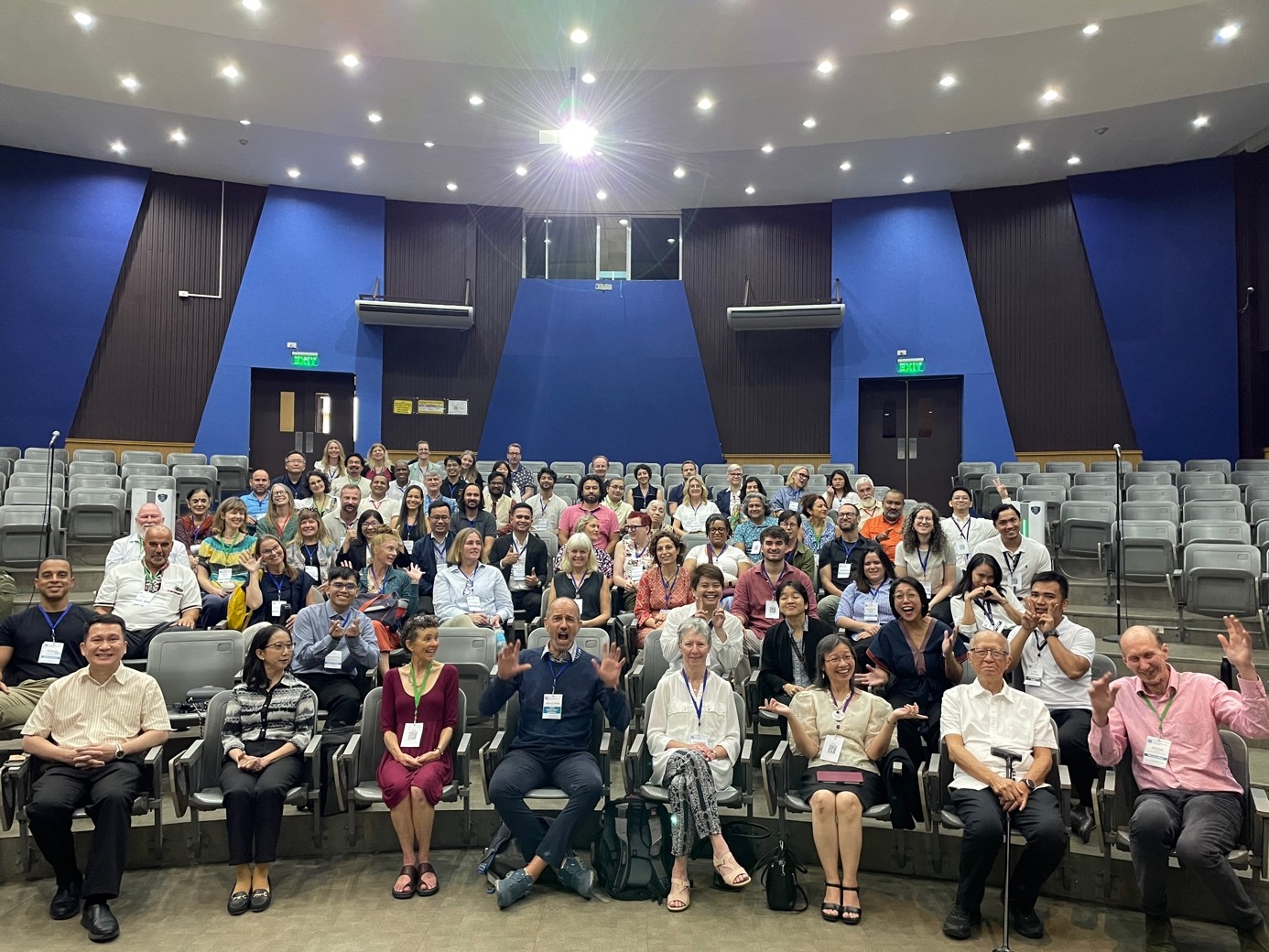
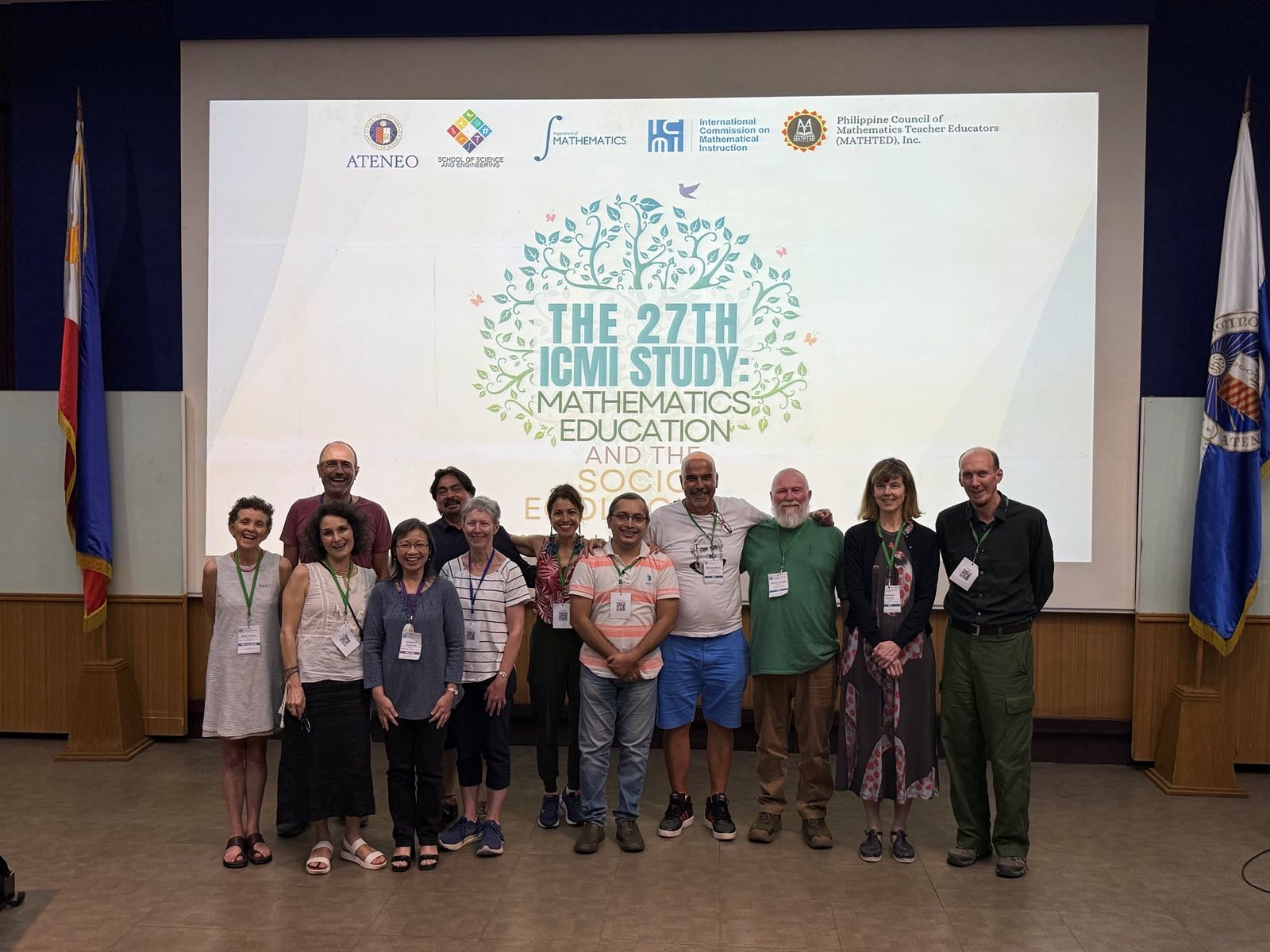
The activity of ICMI Study 27 is organized around four themes, which were conceptualized in relation to tensions in thinking about mathematics education and the socio-ecological. We anticipated that more standard topics (e.g., teacher education, modelling, curriculum, theory) would emerge within and across themes.
The four themes were:
- Aims of Mathematics Education (led by Nathalie Sinclair and Paola Valero);
- Scales of Mathematics Education (led by Rochelle Gutiérrez, Mariam Makramalla, and Armando Solares-Rojas);
- Resources of/for Mathematics Education (led by Marcelo Borba and Vince Geiger); and
- Mathematics Education Futures (led by Arindam Bose and Catherine Vistro-Yu).
The Discussion Document served as a call for papers for the ICMI Study 27 Conference, hosted by Ateneo de Manila University, Philippines on January 22-25, 2025. This was the second ICMI Study to take place in a developing country. Each submission was reviewed by at least two International Program Committee (IPC) members, and a maximum of two authors of accepted papers were invited to participate in the Study Conference. Accepted papers were then revised (when necessary) by the authors before being published in the conference Proceedings (available on the ICMI page for ICMI Studies).
The Proceedings contain 63 papers (see Table 1), with contributions by 135 authors from 24 countries across 6 continents: Argentina, Australia, Austria, Brazil, Canada, Colombia, Egypt, Germany, India, Indonesia, Iran, Israel, Italy, Japan, Mexico, Nepal, Netherlands, New Zealand, Norway, Philippines, South Africa, Sweden, United Kingdom, and the United States of America. Early in the process, we committed to representing all accepted contributions to the Study in the Proceedings even if authors were, in the end, not able to attend in person. The number of such cases was relatively few.
| Topic | No. of Papers |
|---|---|
| Aims of Mathematics Education | 16 |
| Scales of Mathematics Education | 15 |
| Scales of Mathematics Education | 18 |
| Mathematics Education Futures | 14 |
| Total | 63 |
Sixty-five Study Conference participants were warmly welcomed by the Local Organizing Committee (LOC) led by Catherine Vistro-Yu and comprising Angela Fatima H. Guzon, Lester C. Hao, Maria Alva Q. Aberin, Errol Matthew C. Garcia, and their team of 14 student assistants. The successful hosting of the Conference in the Department of Mathematics at Ateneo de Manila University was in no small part due to the generosity and hospitality of the University as well as the Philippine Council of Mathematics Teacher Educators (MATHTED).
A portion of the paid Conference registration fee was allocated to a Solidarity Fund, which was run according to ICMI principles of supporting participation of individuals from developing countries (as classified by the Centre for Developing Countries, CDC). That allocation, as well as an ICMI contribution, enabled the IPC to disburse a total of €4,150 as partial Conference attendance support amongst 13 participants.
We committed to calculating the carbon cost of air travel to the conference. Based on an estimate of carbon emissions done by the LOC, we arrived at a figure of 70,000 tons CO2e. There were efforts to reduce the impact of all other activities, with little paper used, no conference bag and additions, and no single use materials for food and drink. The regular practices of members of the Ateneo de Manila University—zero food waste, clean-as-you-go (CLAYGO), and re-use/re-cycling—provided good modelling for our efforts. To avoid additional travel in Manila, the Conference outings took place on foot on the university campus in the form of either a Sustainability Walk or tour of the Ateneo Art Gallery. The balance of the Conference budget will go towards supporting a community-based environmental education initiative in the Philippines.
The Study Conference activities were arranged around Theme Working Group sessions. Here, participants engaged with the existing scholarship on mathematics education and the socio-ecological as represented in all the papers in the Proceedings, oriented towards taking this knowledge forward collectively in the Study Volume.
These sessions were framed by four plenaries. The first plenary, facilitated by the co-chairs, aimed to build the scholarly community comprising participants with diverse experiences of and perspectives on mathematics education and the socio-ecological. Actively, using drawing, writing, and talking, the participants visualized and shared mappings of both their current socio-ecological contexts and their imagined future socio-ecological contexts and, importantly, what their particular Proceedings paper contributed to realizing this future. The mappings were displayed throughout the Conference and served as a productive reference point in the closing plenary during which participants reflected on the progress that had been made within Themes in just 4 days.
The Theme-based engagements across perspectives and contexts in the Working Group sessions were further prompted, challenged, and enriched by two plenary sessions, each taking the form of dialogues between two invited plenary speakers. The first was addressed by Elizabeth (Liz) de Freitas (USA) and Jose (Jett) Ramon Villarin (Philippines) and the second by Adailton Alves da Silva (Brazil) and Pedro Walpole (Philippines). In the first plenary, Jett presented his work at the Manila Observatory and the modelling they do around climate. Among many insights, he raised the importance of an understanding of “rate” as a concept. The presence of CFCs in the atmosphere, for example, is measured in parts per trillion, where differences of only a few hundred ppt, in CFC concentration, entail the difference between a liveable and unliveable earth. In reflecting on the philosophical dimension of work such as that done by Jett, Liz brought a vital “Science Technology and Society” (STS) perspective to the Conference. STS points to the limits of thinking based on humanism and the need to think with the more-than-human. Liz’s inclusive materialist ideas bring into question binaries such as nature-culture and prompt us to reflect deeply on the historical and political entailments of the concepts we act with and the need for speculating on alternatives.
The second plenary brought together two scholars’ work with Indigenous communities. Pedro’s work with communities in the Philippines includes the development of regenerative forestry practices, which have now led to those communities being the only ones in the valley with reliable water supplies all year around. Indigenous maps, in this region, involve both space and time relations, and there has been a need to integrate such maps with ones recognized by government in making the case for land and water rights. Adailton described the work he does with the A'uwẽ/Xavante people in Brazil and the “ethnopedagogy” he observes. This ethnopedagogy involves a web of three dimensions: cosmological (the construction of the world), socio-ecological (the construction of space and place), and socio-educational (the construction of being). A clear point of connection was the importance of collectivity in the work of both communities—an idea that featured strongly in the work of the conference across all four of our themes. Adailton spoke in Portuguese and was ably translated by Marcelo Borba. The presence of multiple languages and translation added richness and allowed time for powerful moments of contemplation.
The IPC is now working on the design of the Study Volume. Participants in each Theme are developing three or four chapters to elaborate on the “state of the art” of research into mathematics education and the socio-ecological. Each theme will have an introductory chapter, and we are planning some commentaries. This Study represents something of a new adventure for ICMI in that the focus is on an emerging research area, an area that requires extensive collaboration and representation by mathematics educators in diverse contexts.
Starting the New Year
Starting the New Year with the 27th ICMI Study Conference
Frankie Fran – Ateneo de Manila University and Romblon State University – ICMI Study 27 Conference Participant
The 27th ICMI Study Conference with the theme “Mathematics Education and the Socio-Ecological was held from January 22-25, 2025, at the Ateneo de Manila University, Philippines. Sixty-eight mathematics education researchers came to this invitation-only conference representing the following countries: Australia, Brazil, Canada, Colombia, Germany, Great Britain, India, Indonesia, Italy, Israel, Japan, Mexico, New Zealand, Norway, Philippines, Sweden, Switzerland, South Africa, and the United States of America.
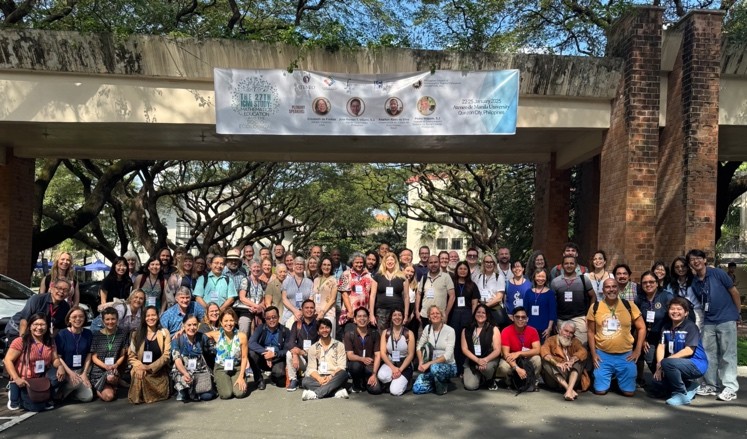 |
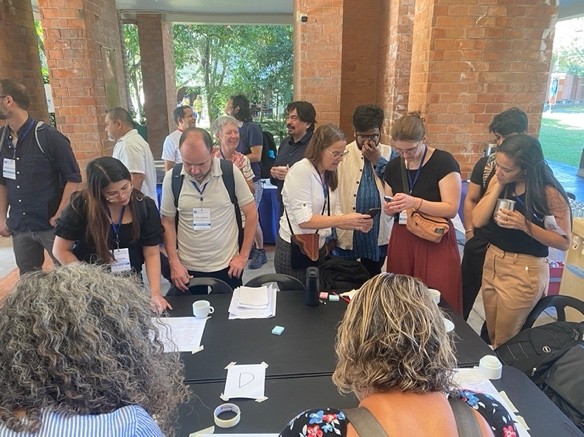 |
| The 27th ICMI Study Conference participants at the Ateneo de Manila University, Quezon City, Philippines | Cross Working Group Session on Day 4 |
ICMI Study 27 is led by co-chairs Alf Coles (United Kingdom) and Kate le Roux (South Africa), together with the International Program Committee members (IPC) Marcelo Borba (Brazil), Arindam Bose (India), Vince Geiger (Australia), Rochelle Gutiérrez (United States of America), Mariam Makramalla (Egypt), Armando Rojas-Solares (Mexico), Nathalie Sinclair (Canada), Paola Valero (Sweden), and Catherine Vistro-Yu (Philippines) and is supported by the Ex-Officio members Frederick Leung (Hong Kong), Merrilyn Goos (Australia), and Jean-Luc Dorier (Switzerland). The Local Organizing Committee (LOC) had a Core Team led by Catherine P. Vistro-Yu, Chair, together with Angela Fatima H. Guzon and Lester C. Hao as Co-Chairs, Maria Alva Q. Aberin as Finance Officer, and Errol Matthew C. Garcia for the Events and Logistics. They were assisted by volunteer students of the Department of Mathematics.
ICMI Study 27 explores the interplay between mathematics education and the socio-ecological. It acknowledges the intricate relationships and connections between people and nature, both living and non-living, including complex interdependencies. The Study focused on four distinct themes with the main aim of exploring the different theories and perspectives on the socio-ecological and its potential contribution to mathematics education: (A) aims of mathematics education, (B) scales of mathematics education, (C) resources of and for mathematics education, and (D) mathematics education futures.
The Scientific Programme of the Study Conference included a Welcome and Opening Program, four Plenary sessions, seven Working Group sessions, one Cross Working Group session, two Campus Engagement Tours, and a Conference Dinner. Plenary 1 was facilitated by the IPC Co-Chairs Alf Coles and Kate le Roux following the Community Activity held during the conference registration. The participants were instructed to form groups of three, preferably with those from a different geographic region, and engage in conversations about their output from the Community Activity.
Plenary Sessions 2 and 3 each featured complementary presentations by two scholars followed by a conversation with the audience facilitated by Nathalie Sinclair and Alf Coles, respectively. In Plenary 2, Filipino climate scientist Jett Villarin discussed what climate action might mean for mathematics education and highlighted that climate action needs to be communicated using the power of numbers as a storytelling tool. Complementing his presentation was Elizabeth de Freitas, who emphasized the concept of rethinking mathematics education as it makes a radical shift, particularly on embracing a “more-than-human” perspective.
In Plenary 3, Adailton Alves da Silva, who was assisted by Marcelo Borba, spoke about his extended thoughts on ethnopedagogies as a socio-educational knowledge and gave a detailed analysis of the different domains fundamental to the ethnopedagogy of the A'uwẽ/Xavante people. Complementing his presentation was Pedro Walpole, an environmental scientist who shared his experiences living with the Pulangiyēn Indigenous community in Bukidnon, Philippines, and highlighted the importance of understanding the indigenous communities’ connections to their ancestral domains as well as the essentiality of utilizing the mother tongue to reinforce their cultural ecology. Plenary 4 served as the closing session and was again facilitated by Alf Coles and Kate le Roux. The session opened conversations on the future steps for the 27th ICMI Study indicating the timelines for possible courses of action. The highlight of Plenary 4 was the sharing by pre-selected conference participants of their thoughts on the Study Conference.
The Working Group Sessions and the Cross Working Group Session dominated the conference program. The four theme groups spent most of each day in their assigned rooms. On the last day, a poster session was held to allow for closer engagements across themes as well as conversations about each proposed chapter. The Study Theme Groups were led and facilitated by Paola Valero and Nathalie Sinclair (Theme A), Rochelle Gutiérrez and Armando Solares-Rojas (Theme B), Marcelo Borba and Vince Geiger (Theme C), and Arindam Bose and Catherine Vistro-Yu (Theme D). The Theme Group Leads prepared session activities that were tailored to engage the participants in productive discussions about their papers as each group aimed to have some concrete plans for possible chapters by the end of the Study Conference.
The Study Conference ended on a hopeful note as participants were buoyed by the collaborative spirit and camaraderie that developed throughout the 4 days. The work continues and the international mathematics education community can look forward to a new ICMI Study publication soon.
Reaching Filipino People
A Post-Conference Forum of the 27th ICMI Study Conference
Shienna Marie G. Amorio – Ateneo de Manila University – ICMI Study 27 Conference Volunteer
The Philippine Council of Mathematics Teacher Educators (MATHTED) Inc. organized the International Commission on Mathematical Instruction (ICMI) Study 27 Post-Conference Forum held January 26, 2025, at the Ateneo de Manila University with the support of the Department of Mathematics and the assistance of student volunteers from the Math Ed Eagles. This Post-Conference Forum follows the conclusion of the 4-day 27th ICMI Study Conference held last January 22-25, 2025, at the Ateneo. The forum, which had the theme Innovations in Mathematics Education: Global Perspectives, aimed to share new ideas from the Study Conference with the Philippine mathematics education community.
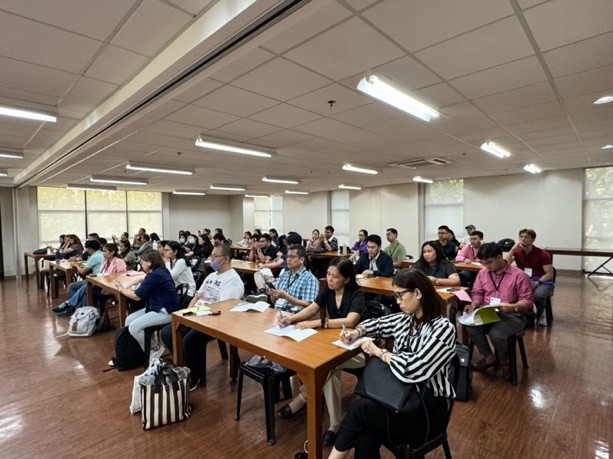 |
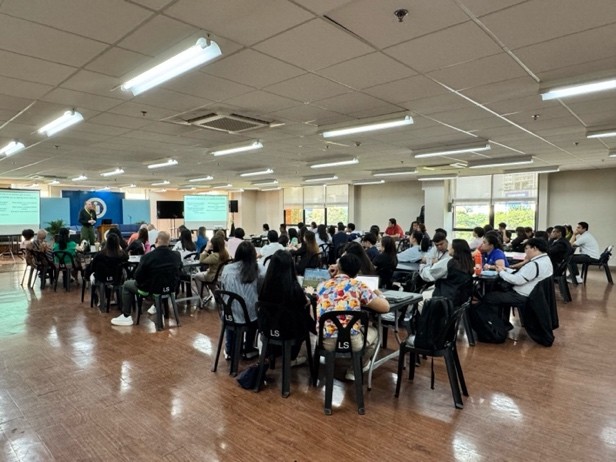 |
|
|
|
The post-conference forum chair, Hadji C. Alegre, opened the event and welcomed esteemed participants and guests from different schools across the country. Alf Coles from the University of Bristol (United Kingdom) and Kate le Roux from the University of Cape Town (South Africa) delivered a joint keynote address entitled “Mathematics Education and the Socio-ecological: A Conversation - between two contexts – about access to relevant, quality mathematics education.” Alf highlighted the intricate relationship between mathematics education and the socio-ecological, presenting deliberate ways to bring context into mathematics and incorporating climate justice and sustainability within the mathematics curriculum. On the other hand, Kate focused on innovations in the mathematics curriculum to conform to local and global relevance. She emphasized the use of the curriculum-organizing principle and outlined the conditions needed to accommodate socio-ecological challenges in mathematics education. Both speakers also cited their current research work in the World Universities Network (WUN).
A panel discussion then followed with international speakers hailing from different universities across the globe. This included Vince Geiger from Australian Catholic University (Australia), Arindam Bose from Tata Institute of Social Sciences (India), Marcelo Borba from Sao Paolo State University (Brazil), Paola Valero from Stockholm University (Sweden), and Kate le Roux. Each of the speakers brought forward their research interests and their experiences in the field and gave their opinions on the emerging trends in technology development.
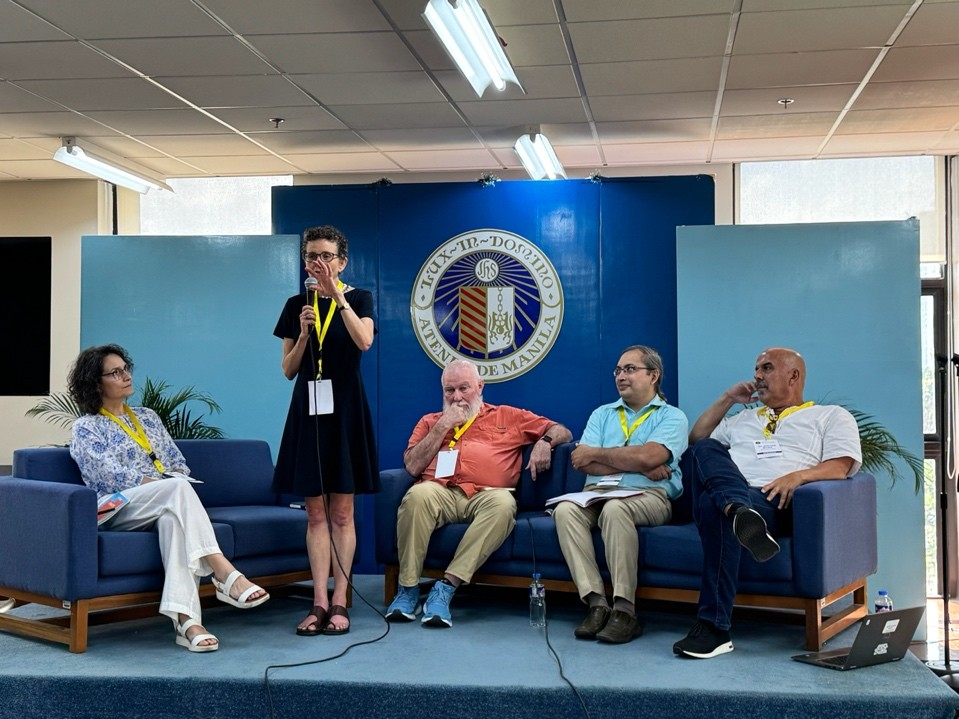 |
|
|
In the afternoon session, the participants were divided into five distinct break-out rooms for in-depth sessions where the invited experts facilitated discussions about their areas of research. Session A with the theme “Digital Video and Mathematical Education Festival” was facilitated by Marcelo. Session B with the theme “Design-based Research: Meaningfully Using Tech Affordances for Increasing Access to Quality Education at Scale” was facilitated by Arindam. Session C on “Critical Mathematical Thinking Project” was facilitated by Vince. Session D with the theme “Classroom Language and Literacy Practices for Accessing, Learning and Communicating Mathematics” was facilitated by Kate. Lastly, Paola facilitated Session E, “Students’ Mathematical Identities: Supporting Productive Learning Narratives.” The break-out sessions brought out ideas from the different participants and provided a window into how different cultures and social climates affect and continually shape mathematics education. This was further highlighted by Catherine Vistro-Yu, MATHTED President, in her talk about future directions in mathematics education, citing the potential future directions in curriculum, pedagogy, assessment, and research. She encouraged educators to continue the practice of employing creativity and open communication with other educators in sharing effective educational strategies.
The conference culminated with reflections shared by participants from different break-out rooms. The summary of key take-aways was presented by Minie Rose Lapinid, MATHTED Vice-President, while Nympha Joaquin (MATHTED National Board) ended the conference with the announcement of future collaboration opportunities in the coming years.
3. Call for intention to Bid ICME-17 in 2032
Call for intention to Bid to organize and host ICME-17 in 2032
ICME is the largest international conference on mathematics education. It is held every leap year and it is the meeting point for mathematics educators, curriculum developers, mathematicians, researchers in mathematics education, teachers, teacher educators and resource producers.
The three ICMI Awards to recognize outstanding achievement in mathematics education are presented at the ICME Opening Ceremony. The Felix Klein Award and Hans Freudenthal Award were established in 2000 and first presented in 2003. While the Felix Klein Award honors lifetime achievement in mathematics education research, the Hans Freudenthal Award instead recognizes a major cumulative program of research. The Emma Castelnuovo Award, first presented in 2016, acknowledges outstanding achievements in the practice of mathematics education.
On the day before the ICME Opening Ceremony, the ICMI hosts a one-day meeting of its General Assembly (GA). Recent ICMEs have also featured a separate Early Researcher Day, usually held before the Congress begins.
ICMI is hereby inviting the ICMI community: ICMI country representatives, national/regional mathematics education and mathematics organizations and academic institutions to consider the possibility of organizing and hosting the International Congress on Mathematical Education in July/August 2032.
Please note: Applications by convention centers, tourist agencies or any other commercial organization will not be considered.
The Guidelines
ICMI recognizes that not all countries have similar conditions to mount a potentially successful bid. Nevertheless, ICMI acknowledges that every bid will have its own advantages and highlights as well as its own weaknesses and difficulties. Therefore, all countries are encouraged to consider bidding according to the guidelines below. The Executive Committee of ICMI will judiciously weigh the weak and strong points of all bids, taking into special consideration proposals from regions in which ICME has not been held in the past or in the last 25 years, and for which the conference will considerably boost mathematics education.
Although this call is only for an expression of intent to bid, ICMI advises that when considering and preparing its submission to organize and host this conference, the potential candidates consider the following – which will be required as part of a full bid document due in November 1, 2026):
- Provide a statement explaining why ICME should take place in the proposed country. Please point out particular highlights but also address honestly potential weaknesses or difficulties.
- Provide a list of national and regional organizations (professional associations, universities, governmental/non-governmental organizations, others) and prominent mathematicians and/or mathematics educators who support the idea of organizing and hosting the conference, and will contribute to the organizational efforts.
- Nominate the chair of the conference (Congress Convenor) and the chair or co-chairs of the local organizing committee (LOC), prepare a brief CV for each of these persons and provide a personal letter of intent signed by them. Bear in mind that whereas all the members of the local organizing committee are appointed by the organizers, the members of the International Program Committee (IPC), who are in charge of the scientific components of the conference, are appointed by ICMI.
- Provide a statement asserting that (a) participants from all over the world (regardless of their nationality) will be allowed freedom of entrance to the hosting country and (b) that all possible efforts will be made and assistance provided in order that all participants who would need an entry visa will receive it.
- Provide a concise description of the venue (and its facilities) available to host the academic activities of the conference (expected attendance of 2,500-3,000 participants).
- Provide a description of the amount/type of accommodation that can be offered to the participants and speakers, including an adequate amount of inexpensive lodging. Provide some information about distances to the venue and availability of convenient transportation.
- Provide an estimate of the budget and list possible sources of funding (including intention to approach commercial, governmental or philanthropic entities). Bear in mind that the registration fees to be collected from the participants should be within the range of the fees charged in previous ICMEs. Please take into account: personnel costs; publication costs (Proceedings, website, program app); hiring of the venue; equipment (including videorecording of main sessions); social events (welcome reception, farewell, happy hour, excursion, coffee breaks); invited participants (travel and accommodation of plenary speakers); costs of the organization of two IPC meetings, at least the first of which must be held in-person (costs for an in-person meeting include travel and accommodation of 15-20 members for a one-week period); insurance and miscellaneous expenses. The host country/LOC of an ICME is fully responsible for the congress budget, including revenues and expenses. ICMI is unable to underwrite losses incurred during an ICME. Thus, the financial responsibility ultimately lies with the bidding organization. All sources of income other than the registration fees are the full responsibility of the hosts. ICMI will contribute to the ICME budget with two installments of 5,000 Euros (a total of 10,000 Euros). This amount may be requested at any time before or after the Congress.
- Provide an estimated timeline for the publication of the Proceedings.
ICMI warmly recommends potential bidders to approach previous conference chairs (convenors) in order to gain first-hand information about the character and scope of the task. All members of the Executive Committee (EC) of ICMI, and certainly the President and the Secretary-General, will be open for consultation towards the preparation of the proposal.
Any bid for an ICME should be presented BY MATHEMATICS EDUCATORS/ MATHEMATICIANS in agreement with the Mathematics Education Associations of the hosting country and endorsed by both the Mathematical Association/ Organizations and the country representative to ICMI.
For the past ICME local organizers and hosts, please go ICME-15 held in 2024 in Sydney, Australia; ICME-14 held in 2021 in Shanghai, China; ICME-13 held 2016 in Hamburg, Germany
Further details
Please also check out this page for more information
Please send (if possible) the preliminary declaration of intention of presenting a (final) bid to act as host for ICME-17 (in 2032) (acknowledging each of the above points) by December 1, 2025, via e-mail to:
Jean-Luc Dorier
Secretary-General of ICMI
Next Deadlines/Further process
- Firm (final) bids should reach the Secretary-General via email by November 1st, 2026.
- The decision about the site of ICME-17 (held in 2032) will be announced before the end of 2027.
- During 2028 the ICME-17 Host and ICMI EC will sign the "Agreement between the Host Member and ICMI regarding the hosting an ICME congress".
It is possible that a firm (final bid) is presented to ICMI by November 1, 2026 without having presented a preliminary intention in 2025.
In case of any questions, please contact via e-mail:
Jean-Luc Dorier
Secretary-General of ICMI
4. Updates from ICME-16
Naďa Vondrová Convenor, ICME-16
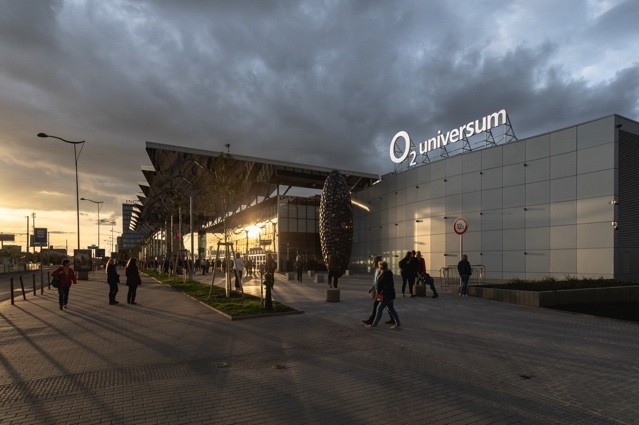 |
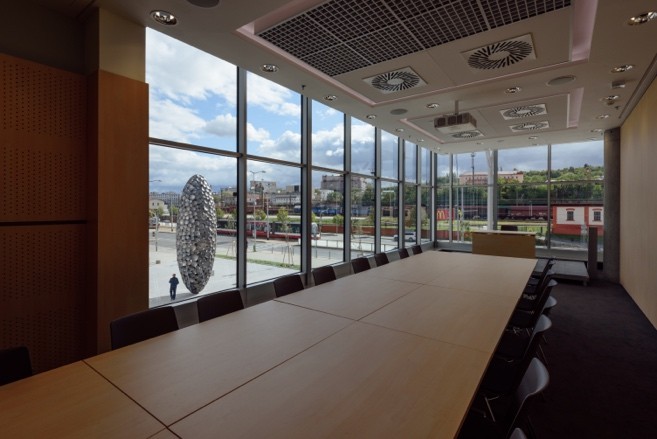 |
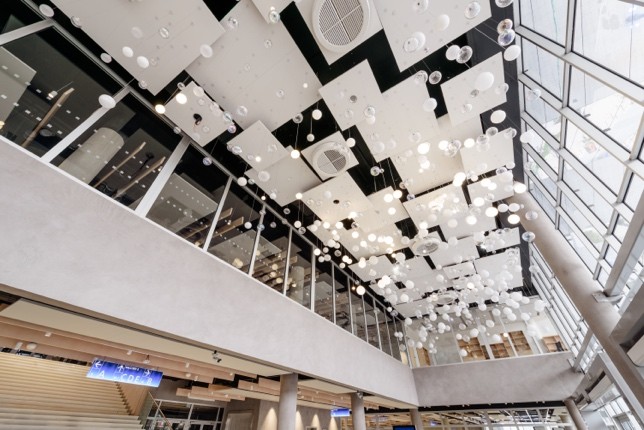 |
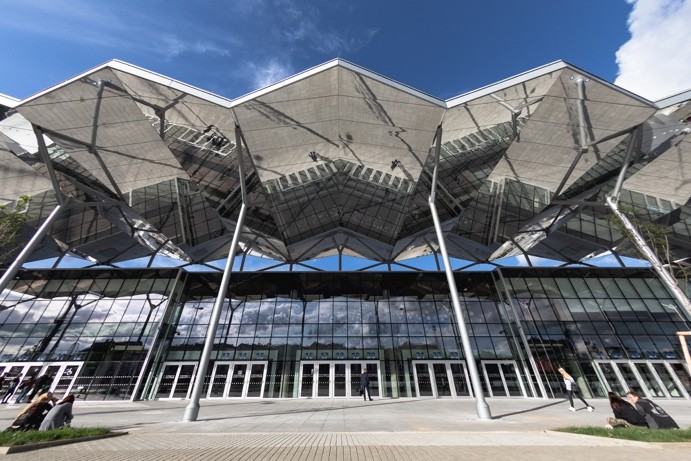 |
 ICME-16 is set to take place in the heart of Europe—Prague, Czech Republic on July 9-16, 2028. Our venue, O2 Universum, is ready to welcome thousands of participants, and we are aiming for an incredible turnout!
ICME-16 is set to take place in the heart of Europe—Prague, Czech Republic on July 9-16, 2028. Our venue, O2 Universum, is ready to welcome thousands of participants, and we are aiming for an incredible turnout!
The preparations for this prestigious congress are well underway. First and foremost, ICMI has established the International Program Committee, bringing together professionals from around the world. Their first onsite meeting is scheduled for September 15-19, 2025, in Prague. This early start gives us plenty of time to shape a rich and dynamic program, ensuring that all invited speakers and presenters are confirmed well in advance.
A special highlight of ICME-16 will be the Afternoon of Central and Eastern European Countries. Given the region’s shared history and wealth of insights to offer, we are thrilled to create this unique event. A dedicated group of ambassadors from 12 countries has come together to explore the theme: Mathematics communities, curriculum, and teaching in the 1970s/80s, the 1990s, and today. Researchers across the region have already begun collaborating on various aspects of this important topic.
We extend our sincere gratitude to the ICMI Executive Committee for entrusting us with the organization of such a prestigious event. ICME-16 is not only a fantastic opportunity for global collaboration but also a chance to highlight the contributions of our region to the field of mathematics education research.
We can’t wait to welcome you to Prague in 2028—let’s make ICME-16 an unforgettable experience!
The composition of the IPC was finalized by the ICMI EC on July 5, 2024 during the ICMI EC meeting.
ICME-16 International Program Committee (IPC):
International IPC Members:
- Lisa Lunney Borden (Canada)
- Soledad Estrella (Chile)
- Alessandro Ribeiro (Brazil)
- Sarah González (Dominican Republic)
- Xiaoli Lu (China)
- Maitree Inprasitha (Thailand)
- Jayasree Subramanian (India)
- Mariam Makramalla (Egypt)
- Forster Ntow (Ghana)
- Anthony Essien (South Africa)
- Arne Jakobsen (Norway)
- Jenni Ingram (UK)
- Iman Osta (Lebanon)
- Lisa Darragh (NZ)
IMU Nominee:
- Solomon Friedberg (USA)
Local members:
- Naďa Vondrová (IPC chair/Convenor)
- David Janda (LOC co-chair)
- Ladislav Kvasz (LOC co-chair)
- Jasmina Milinković (Serbia)
Ex-officio:
- ICMI 2025-2028 President: Merrilyn Goos (Australia)
- ICMI 2025-2028 Secretary-General: Jean-Luc Dorier (Switzerland)
- Past IPC Chair ICME-15: Kim Beswick (Australia)
5. Klein Project
News from the Klein Project
Ferdinando Arzarello, Samuel Bengmark, and Hans-Georg Weigand for the Klein-Project Design Group

The Klein Project is an IMU/ICMI project with the aim of producing mathematics resources for secondary teachers on contemporary mathematics. It was inspired by Felix Klein’s book Elementary Mathematics from a Higher Standpoint, first published over 100 years ago. It is intended as a stimulus to help mathematics teachers make connections between the mathematics they teach, or can be asked to teach, and the field of mathematics while taking into account the evolution of this field over the last century. A Design Group was established and plans formed to produce “Klein-vignettes”. A vignette is a short, readable piece on a topic of contemporary mathematics. Besides these vignettes, the Klein project also works on “Bridging Klein vignettes,” bridging the gap between the mathematics explained in a classical vignette and its use in the classroom.
In recent years, the Klein Project has developed a number of Klein vignettes on topics such as Map Coloring, Higher Dimensions, How Google Works, Banach’s Fixed Point, Benford’s Law, Public Key Cryptography, Solving Equations, Art and Math, and Galois Theory. We also draw attention to newly published books, interesting projects, and conferences. In December 2024, the Klein blog with the vignettes was moved to a server in Berlin. This should also be a good time to reorganize the project in terms of content and personnel.
At the CERME 14 conference in Bolzano in February 2025, a Klein information meeting was organized to invite new people to the project. In particular, we were looking for mathematicians, mathematics educators, and teachers interested in:
- writing new Klein vignettes and bridging vignettes
- translating existing vignettes into any language
- writing a page of the month
- providing technical support for the homepage and blog
- making connections with other projects
- encouraging collaboration with teachers in designing concrete classroom activities based on Klein vignettes
- organizing a Klein conference anywhere
- establishing contacts with organizations that support the Klein project financially
We were surprised by the great interest in the Klein project. We subsequently received a lot of positive feedback from interested parties who wanted to get involved in the project. We are currently in the process of integrating these people into the project. However, we are also grateful for anyone who would like to work on this project, in whatever form.
6. News from CANP 4
Mary A. Ochieng – Strathmore Institute of Mathematical Sciences, Nairobi, Kenya
The CANP4 (East Africa) country representatives identified a baseline survey as a beginning point of obtaining data about the learning needs of the Mathematics Teacher Educators (MTEs) from their respective countries. A series of virtual engagements and communication via WhatsApp and E-mail led to the first joint MTE meeting on February, 28, 2025. At this meeting, information about the history of other CANPs was disseminated. The objectives of CANP4 were also discussed along with the expected outcomes. MTEs were encouraged to make presentations at the upcoming AFRICME7 conference to be held in Johannesburg. Moreover, sharing learning engagements, collaborations through joint research, and talks and discussions on emerging issues in teaching and learning mathematics were emphasized by every presenter.
Planned Activities
- Country CANP4 meetings with MTEs: Each CANP4 country representative held an in-country meeting with MTEs to discuss plans for the year. All meetings were held until June 2024.
- The virtual meeting that planned for the baseline survey items was held on June 27, 2024 by all CANP4 country representatives.
- Refining of the Google baseline needs assessment survey items by all the members was done from June 13-20, 2024. The baseline survey can be found here.
- Administering of the baseline needs assessment by all CANP4 country representatives was held from July to August 2024.
- A joint virtual meeting for all MTEs from Kenya, Uganda, Tanzania, and Rwanda was held on February 28, 2025, to share findings of the baseline survey and roll out activities for the year. Action Research was identified as a key area of need by one of the CANP4 country representatives. The meeting picture caption can be found here.
- Country reps held a consultation and planned to roll out monthly meetings to address the needs emerging from the baseline survey.
Expected Outcomes
- Improved recruitment of members for each of the countries based on the strength of collaboration identified from the baseline survey.
- Implementation of the five themes identified from the needs of the baseline survey; management of large classes, use of active learning strategies in teaching and learning mathematics, technology integration in teaching mathematics in the era of AI, and strategies for self-improvement and scholarship of teaching and learning.
- A detailed report about the baseline survey to be shared with the members for reference in their respective country meetings.
7. CERME-14
Great moments at the CERME-14 in Bolzano (Italy)
Núria Planas, Universitat Autònoma de Barcelona, ICMI EC Member (2025-2028)
The great experience of the 14th CERME in Bolzano was just a few weeks ago. The time when the COVID pandemic did not allow us to visit the alpine Bolzano area, in February 2022, is fortunately over, and we could finally enjoy many face-to-face scientific and social exchanges. The CERME12 online conference had already given us a clue of the professionalism and warmth of the Bolzano team, which we could now vividly witness. In fact, they succeeded twice! They first met the challenge of the online format in 2022 and then the challenge of running a crowded but smoothly flowing congress. More than 900 people and 29 Thematic Working Groups (TWGs) represents quite an achievement. In this way, the European Society for Research in Mathematics Education (ERME) continues growing and contributing to the international community of research in mathematics education. A big thanks to all those who made CERME14 a reality.
Some great moments in Bolzano embraced, for some of us, the pre-CERME moments around YERME-Day with young researchers and workshops. I was offered the opportunity to participate in YERME-Day and run a workshop on scientific writing in two slots. Twenty-five young researchers from Europe and the American continent had signed up for each of the slots. Time was so short, and I learned so much from the questions and comments of the early-career researchers! Group of young researchers has always been a priority of ERME. An ideal condition for the development of any research community is precisely the creation of shared spaces for reflective practice between early-career and so-called senior researchers, and YERME-Day is one such space. This ideal condition was also accomplished during CERME-Days in the retitled TWG09 on “Interaction, communication and language in mathematics education” through the balanced participation of young and senior researchers. In the TWG09 room, there was a mixture of new faces, including early-career and senior researchers as well as continuing career-long members, as I guess was the case in all the TWG rooms.
The plenary events were structured into one morning session and two afternoon sessions. One of the plenary sessions focused on the topic of “Climate change and mathematics education,” very much in line with the topic of the ongoing ICMI Study 27, “Mathematics education and the socio-ecological.” The dialogue format was an excellent idea of the CERME14 international program committee. The two plenary speakers, Alf Coles and Kjellrum Hiss Hauge, raised many open questions and facilitated our reflection through their dialogue. The apparent simplicity of the dialogue format embedded a strong message regarding the essence of thinking and researching. More than individual activities, thinking and researching are activities developed through and informed by social processes and sustained dialogue. The plenary on “The new role of data in society: Exploring challenges and opportunities for mathematics education in the age of data science and AI,” with conversation between Michelle Wilkerson and Rolf Biehler, was one more account of this strong message.
I wish I could comment on every single moment of excitement and learning during the days of CERME14, but this cannot be a “super text.” Let me just finish by saying that the next venue will be Slovakia. CERME15 will be held in Bratislava, from February 8-12, 2027. When waiting for my flight home, I could not grow bored. At the airport with some colleagues, we started planning for the 2027 congress. It is too early to know the themes of the plenary events, the reorientations if any in the foci of the TWGs, or the issues and concerns that will have emerged in the ERME agenda. Nonetheless, we were sure that CERME15 will be worthwhile, for us and for the young researchers working with us in our places. My thanks in advance to the dedicated group of people in Slovakia that will make CERME15 a reality. This project will substantially support the local community of mathematics education researchers in the country and beyond.
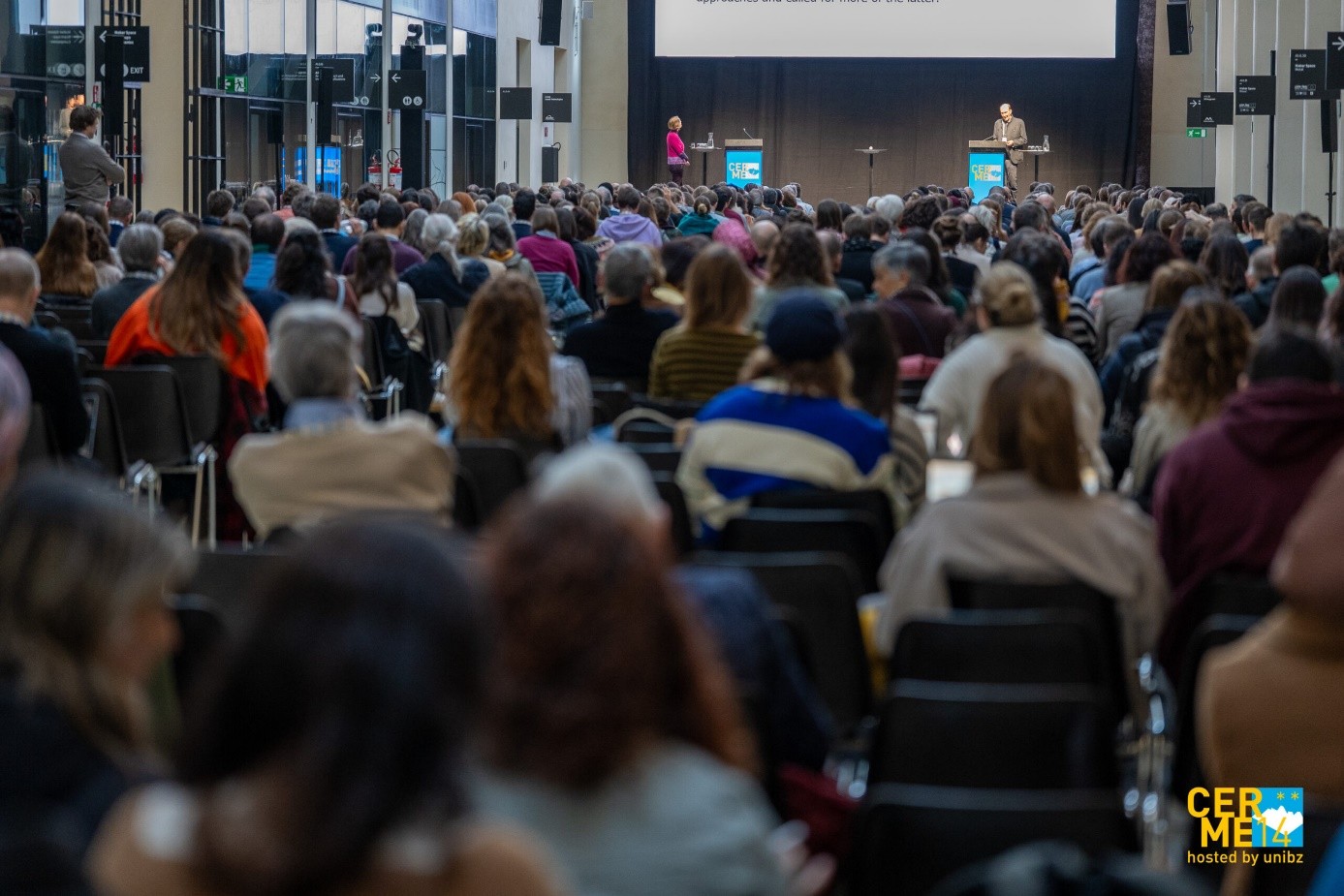
8. In memoriam – Ole Skovsmose
In memoriam – Obituary for Ole Skovsmose, 1944 – 2025 | Dare to imagine, dare to live!
By Paola Valero, Department of Teaching and Learning, Stockholm University
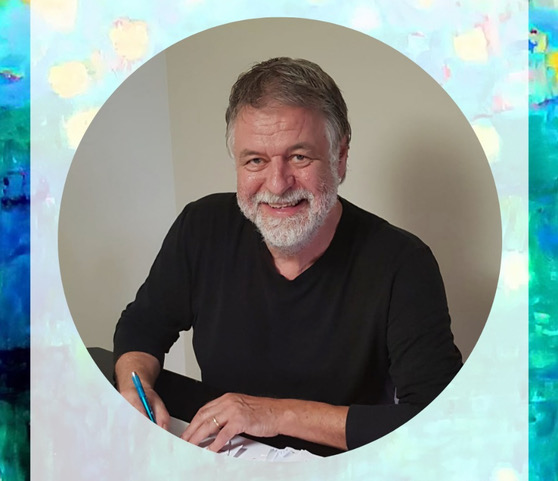
Photo by Miriam G. Penteado, on Ole Skovsmose’s paiting “Butterflies”. Photo composition by Amanda Q. Moura.
Ole Skovsmose was born in 1944 in Hjørring, Northern Denmark. He attended Hjørring Teacher Training College (1963–1967) and earned his teaching qualifications for the Danish public comprehensive school. He then studied mathematics and philosophy at Copenhagen University (1968–1975) while also working as a teacher educator at Copenhagen Day and Evening Teacher Training College. In 1977, he began his doctoral studies at the Royal Danish School of Educational Studies, where he developed his initial ideas on critical mathematics education. Drawing from Critical Theory, he examined how mathematics teaching and learning in classrooms can often be an oppressive experience for students and explored possibilities for teachers to change this. Although his work was not initially well received—since connecting social and philosophical critique to mathematics and mathematics education was almost unimaginable at the time—he earned his Ph.D. in 1982 and subsequently published his thesis as a book for teachers in Denmark. This marked the beginning of a prolific academic career and authorship
In 1982, Ole returned to Northern Denmark to join Aalborg University, where he worked in several departments and collaborated with researchers in mathematics, science, technology and society studies, philosophy, communication, and educational research. Aalborg University’s problem-based and project-organized curricular model nurtured the development of his work on the philosophy of mathematics and the philosophy of mathematics education. In 1990–1991, Ole stayed at Cambridge University, seconded by Alan Bishop, where he shaped his seminal book Towards a Philosophy of Critical Mathematics Education (1994, Kluwer). With this work, he earned the degree of Doctor of Science (Dr. Scient.)—an academic degree above the Ph.D. level. He became a Full Professor in 1996 and retired in 2009. Since then, Ole was Professor Emeritus at the Department of Culture and Learning at Aalborg University and was also associated with the São Paulo State University in Rio Claro, Brazil, where he voluntarily taught and supervised Ph.D. students.
Ole left behind a legacy of powerful ideas in mathematics education, which made him a deserving recipient of ICMI’s Hans Freudenthal Medal in 2024. His strong intellectual contributions spanned three key areas: the possibilities and limitations of school mathematics education practices; the performative role of mathematics in science, technology, and society; and the philosophy of mathematics. Together, these provided a comprehensive framework for critical mathematics education. His numerous papers and books, including his most recent publication, Critical Philosophy of Mathematics (2024, Springer), are a testament to his relentless research engagement and his extraordinary ability to communicate deep, sophisticated ideas in accessible ways. Although Ole published extensively as a single author, he also collaborated with numerous colleagues from around the world. He was always generous in acknowledging the contributions of teachers and both young and experienced researchers to his work.
Beyond his written legacy, Ole was a person to be remembered—attentive, curious, sharp, and wittily entertaining. He was happy and extremely optimistic, even when his body was seriously failing. He rarely got upset—except when his computer did not do what he wanted—and he never thought or spoke badly of anyone. He loved social moments and had a remarkable ability to turn small incidents and observations into fantastic stories, where the banalities of everyday life blended seamlessly with deep philosophical reflections. He had an enormous desire to live and express his observations, thoughts, and emotions. Indeed, he was also an accomplished artist, exhibiting his paintings in galleries across eleven countries. His artwork developed a unique and distinctive style, serving as a creative space that enriched his thinking.
One important lesson I will always carry from Ole is that imagination in research and thinking is the most powerful political commitment to changing the world we live in. Ole dared to imagine; he dared to think and live. His work opened many doors for asking serious “what if…” questions in fields of knowledge that often strive to establish certainty. His passion and presence will be deeply missed by his wife, Miriam Godoy Penteado, his children, Li Skovsmose and Nicolai Skovsmose, his extended family in Denmark and Brazil, and all of us—his colleagues and friends—who were inspired by his invitation to dare to work toward a more just and fairer world. As we continue “traveling through” the paths of life and (mathematics) education, we carry his vision forward.
See citation for Ole Skovsmose’s 2024 Hans Freudenthal Award
9. Eric R. Muller
Math Learning Centre named after Professor Eric R. Muller
Bernard R. Hodgson - Université Laval, Québec, QC, Canada
Chantal Buteau - Brock University, St. Catharines, ON, Canada
It may be rather rare nowadays that a university room be named after a person not in gratitude for a generous financial donation—however important these may be in the life of universities—but as a tribute to academic excellence and dedication. Such an event occurred recently at Brock University (Canada) when the Learning Centre of the Department of Mathematics and Statistics became the “Eric Muller Math & Stats Learning Centre.”
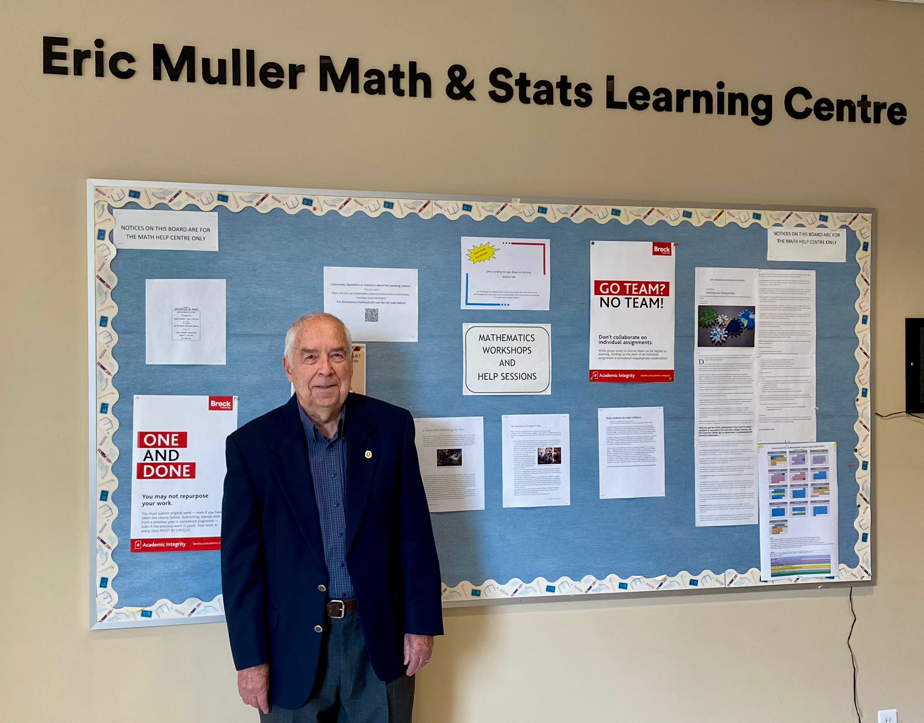
Professor Emeritus Eric René Muller has been an active mathematician at Brock University since 1967, 3 years after its establishment, until his retirement in 2004. He played a crucial role in the development of the mathematics teaching and learning environment at his university, notably in connection with the conception and setting up of the so-called MICA program (Mathematics Integrated with Computers and Applications), still a hallmark of undergraduate mathematics education at Brock, as well as in the instigation of a concurrent education program for secondary school mathematics teachers in which students are led to develop discipline knowledge and teaching skills in tandem.
Eric Muller was born in Morija (Lesotho) in 1938 and received his school education in France, Lesotho, and South Africa. He studied applied mathematics at the undergraduate and master’s levels at the University of Natal (now the University of KwaZulu-Natal, South Africa) and got a PhD degree in theoretical physics from the University of Sheffield (England) in 1967, just before joining Brock University.
His contributions to mathematics education are original, numerous, and varied, as he was over the years active in many contexts at the Canadian, North American, and international levels. Besides awards recognizing specifically his excellence in teaching—from his home university (1990), from the Ontario Confederation of University Faculty Associations (OCUFA, 1994), or from the Mathematical Association of America (MAA, 1996)—he also received honors stressing his sustained and outstanding contributions to mathematics education: the Adrien Pouliot Award of the Canadian Mathematical Society (CMS, 1999), the Michael Smith Award for science promotion of the National Research Council of Canada (NRC, 2002), and the Lifetime Achievement Award of the Ontario Association for Mathematics Education (OAME, 2005). He was moreover appointed to the inaugural class (2002) of Fellows of the Fields Institute for Research in Mathematical Sciences in recognition of his endeavor in fostering the development of a mathematics education group within the institute.
In the 20 years since his retirement, Eric has continued joint research and engagement in mathematics education with one of the authors of this news piece, focusing mainly on technology in undergraduate mathematics, and has participated in some 70 refereed book chapters, journal papers, conference proceedings, etc.
Through his involvement in the Canadian Mathematics Education Study Group in the early 1980s, Eric Muller was connected with various activities of ICMI and especially with the ICMI Study program launched by ICMI President Jean-Pierre Kahane and Secretary-General Geoffrey Howson. He took part in the very first ICMI Study in 1985, the theme of which was the influence of computers and informatics on mathematic and its teaching. He co-authored two papers accepted for this Study, one on the teaching of calculus and another one on discrete mathematics. A few years later, the theme of this Study was revisited by ICMI under the auspices of UNESCO, and Eric and one of us were then invited to write an overview paper about the impact of symbolic mathematical systems on mathematics education. Some 20 years later, the theme of the first Study was visited yet again by ICMI as the 17th Study (2006). With one of us, he then co-authored another supporting paper related to the integration of digital technologies in undergraduate mathematics education.
Eric Muller contributed supporting papers to quite a few other ICMI Studies, especially in the early years of the program, including the third ICMI Study on mathematics as a service subject (1987), the eighth Study on mathematics education as a research domain (1994), and the eleventh Study on the teaching and learning of mathematics at the university level (1998). He also served on the program committee for the 14th Study on applications and modelling in mathematics education (2004).
He played important roles on the program of two International Congresses on Mathematical Education. He was one of the two organizers of a Mini-conference on calculators and computers, a half-day event fully occupying the first afternoon of ICME-7 (Québec, 1992) and proposing to all participants a mixture of plenary talks, small group presentations, and workshops focusing on hands-on activities. He was also the chief organizer at ICME-8 (Sevilla, 1996) of the working group on mathematics as a service subject at the tertiary level.
Eric played many crucial roles related to ICME-7, as he was a member of three major committees of the congress: the National Committee responsible for the congress (this was a Canadian event), the Executive Committee of ICME-7, and the International Programme Committee, appointed by ICMI. But there is a very special (and somewhat behind the curtain) role that he played that ought to be mentioned and to which one of the authors was closely connected as one of the two main local organizers of ICME-7.
A few months before the opening of the congress, Eric presented a special request to the ICME-7 Local Organizing Committee: He wanted to have an office room just for himself, close to the congress secretariat, for the full week of the congress. When asked about the purpose of such a room, his reply was: “I want to be the troubleshooter!”
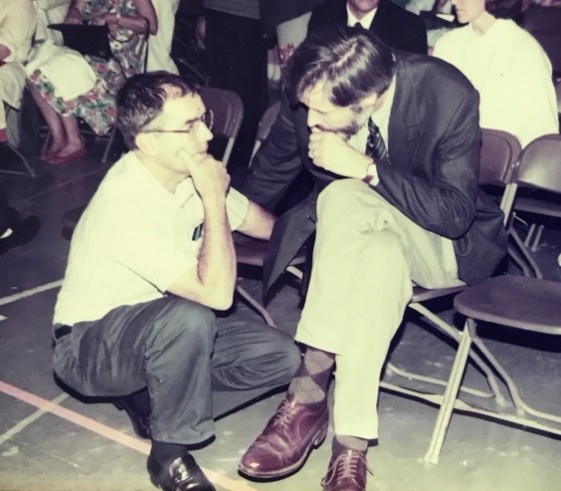
He explained that, based on his experience in organizing previous congresses and considering the size of ICME-7, he knew that there would be loads of problems cropping up every day. It would be totally impossible to have a committee meeting to solve these, thus someone familiar with the whole structure of the congress should be empowered to promptly make decisions. He added that he would be happy to play such a role during the whole week of the congress.
This he did! The many decisions made on the spot by Eric, some possibly small but others much more significant, clearly played an essential role in the success of ICME-7.
That is Eric Muller: a practical person, a man of action, a man of conviction, a man of vision. An exceptional colleague in many ways.
It may thus be seen as most appropriate that the Department of Mathematics and Statistics of Brock University proposes as a model to its staff and students a person of such distinction.
For more information on the Eric Muller Math & Stats Learning Centre: https://brocku.ca/mathematics-science/mathematics/the-mathematics-learning-centre/
10. News from CDC
News from the IMU Commission for Developing Countries (CDC)
Ludovic Rifford, CDC Secretary for Policy
The next International Congress of Mathematicians will take place in Philadelphia, USA, from July 23-30, 2026. The call for applications for the ICM 2026 Travel Support Program, which provides financial support to mathematicians from eligible developing countries to attend, is now closed. The program received an impressive number of applications from across all continents. Applicants will be notified of the results in the spring of 2025.
We would like also to remind you about the IMU-Simons Research Fellowship Program for Developing Countries, generously funded by the Simons Foundation. This new grant program supports mathematicians based in developing countries in undertaking collaborative research at mathematical institutions abroad. The CDC strongly encourages mathematicians and students from developing countries to apply to our calls listed below and to contact us for further detail via email at .
Grants for Institutions
- Volunteer Lecturer Program (next deadline June 1, 2025, for courses to be held between August 1, 2025, and August 1, 2026)
- Library Assistance Scheme (no fixed deadline)
Grants for Conferences and Projects
- Conference Support Program (next deadline April 15, 2025, for conferences starting after August 15, 2025)
Grants to Individuals
- Abel Visiting Scholar Program (next deadline April 30, 2025, for research visits between September1 and December 31, 2025)
- IMU-Simons Research Fellowship Program for Developing Countries (next deadline April 15, 2025, for research visits starting between August 1, 2025, and August 1, 2026)
Graduate Scholarships
- IMU Breakout Graduate Fellowship Program (next deadline May 31, 2025)
- Graduate Research Assistantships in Developing Countries (GRAID) Program (next deadline on May 15, 2025)
11. News from Affiliate Organizations
EMF
News from EMF – Espace Mathématique Francophone – Next symposium in May in Montreal
Faten Khalloufi (Tunisia), president of the Executive Bureau
The next Symposium EMF 2025 will be held from May 26-30, 2025, at the University of Québec in Montreal (Canada). It is organized by a consortium composed of the University of Québec in Montréal, the University of Québec in Outaouais, the University of Québec in Abitibi-Témiscamingue, the University of Québec in Rimouski, the University of Québec in Trois-Rivières, The University of Sherbrooke, the University of Montreal, and the University Laval in Quebec City.
The theme of this symposium is “Mathematics education facing a world in acceleration: Issues, challenges and opportunities.”
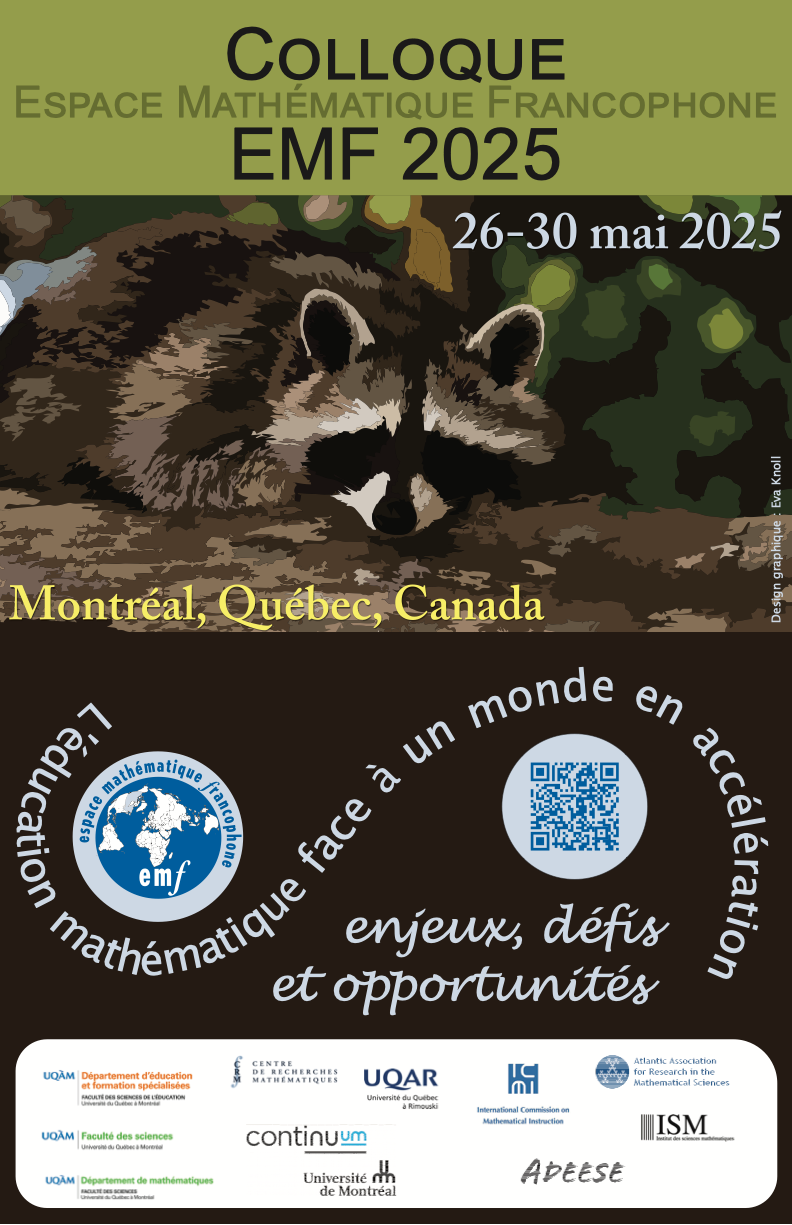
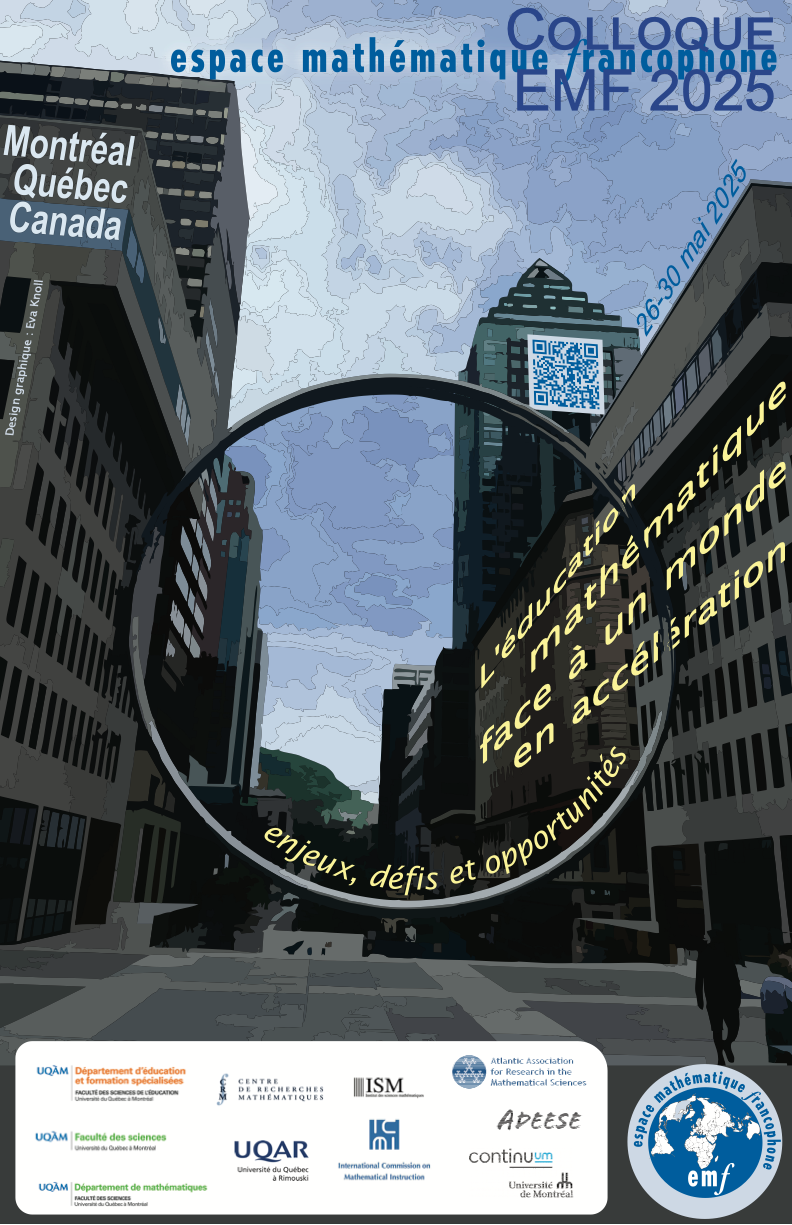
ERME
News from ERME - the European Society for Research in Mathematics Education – Report of CERME14
Frode Rønning, president of ERME
The 14th Congress of the European Society for Research in Mathematics Education, CERME14, was held from February 4-8, 2025, in Bozen-Bolzano, Italy. The CERME conferences have traditionally been held every second year in early February, and, after some disruptions due to the pandemic, they are now back on track. The congress attracted 850 participants from more than 50 countries. The number of participants has been steadily growing from around 100 at CERME1 in 1998, but it seems to have reached its maximum now. Going beyond 900 will make it extremely difficult to find a suitable location (read university) where the congress can be held at reasonable costs. The ERME Board is very grateful to the Free University of Bozen-Bolzano for having taken on the task to organize CERME14.
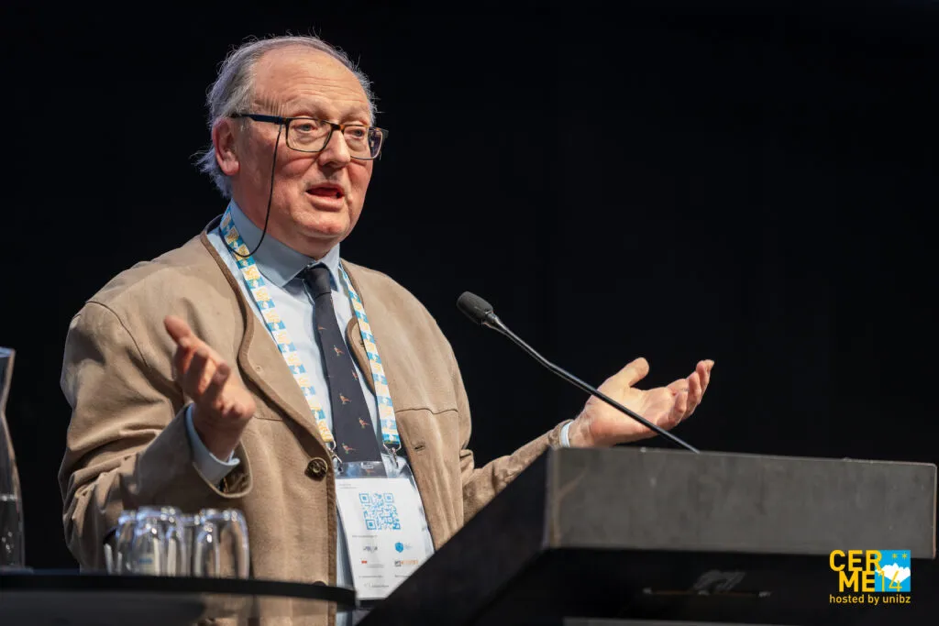
At every CERME there is a General Meeting where new members of the Board are elected. At CERME14, a new president was also elected, professor Frode Rønning from the Norwegian University of Science and Technology. He replaced professor Carl Winsløw, University of Copenhagen, who served as president for the last 4 years. The ERME Board is very grateful to Carl for his great work as a president of the Society. Other new Board Members are Berta Barquero, University of Barcelona, Florian Schacht, University of Duisburg-Essen, Hanna Palmér, Linnæus University, and Derya Cosan, University of Copenhagen, with Derya as a new representative of the Young Researchers (YERME).
During CERME14 awards were given for Best Papers and Best Posters. The Best Paper Award was presented to Alissa Fock (Würzburg University) and Christoph Oberbucher (University of Graz). The Best Poster Award was presented to Wenfei Dui, University College London, Giulia Bini, University of Milan, and Emine Shaka, Kassel University.
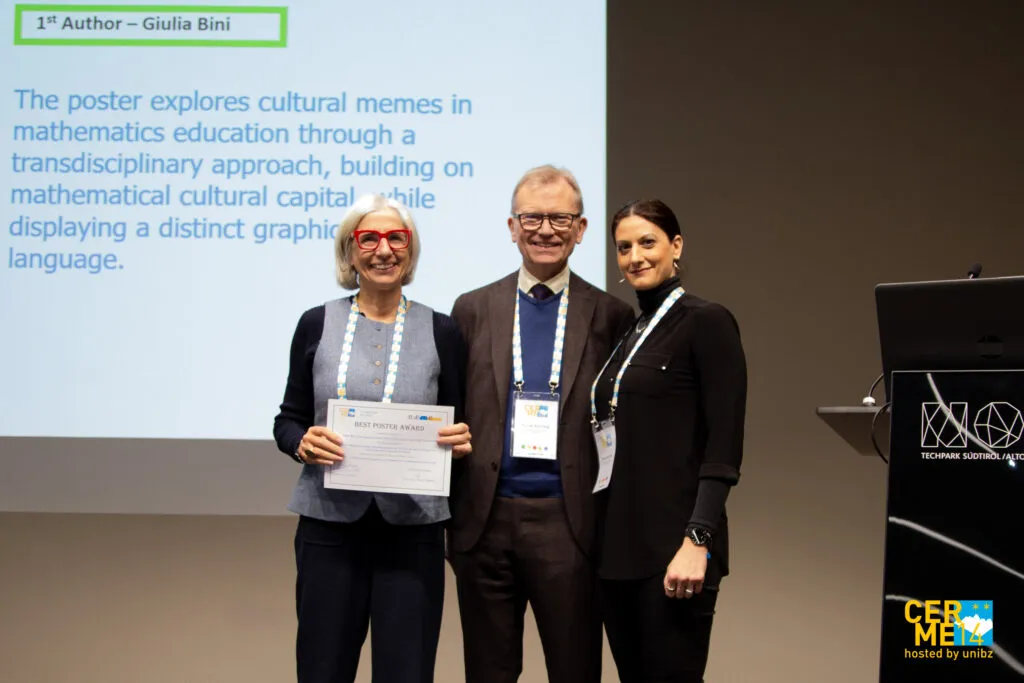
Special activities for young researchers are important parts of the work of ERME. These activities include a pre-event to the CERME, the so-called YERME Day, and a summer school, YESS.
YERME Day was organized immediately before CERME14 as usual, and the next summer school, YESS14, will take place in Utrecht, The Netherlands from August 2-7, 2026.
ICTMA
News From ICTMA – Welcome to the 22nd International Conference on the Teaching of Mathematical Modelling and Applications (ICTMA22), August 11-15, 2025
Jonas Bergman Ärlebäck – Chair of ICTMA22
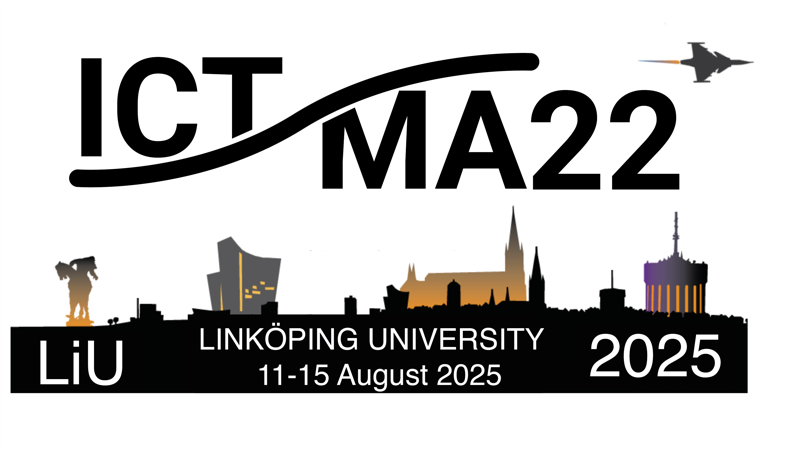
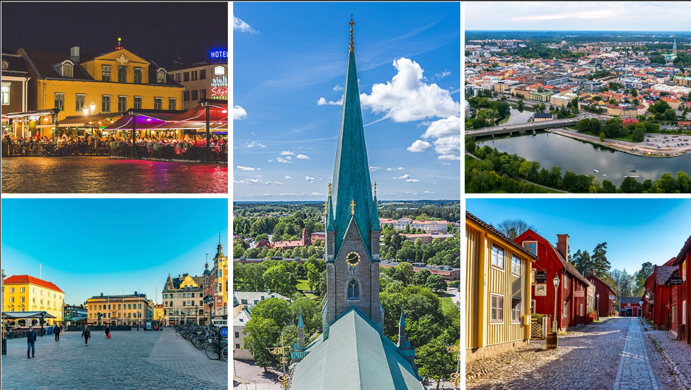
In 1989 the fourth International Conference on Teaching of Mathematical Modelling and Application (ICTMA4) was arranged in Roskilde in Denmark. For ICTMA22 in 2025, we extend an invitation to all researchers, teachers, and mathematicians interested in the teaching and learning of mathematical modelling and applications to return to Scandinavia again—but this time to Sweden and the city of Linköping!
There will be a keynote address by Professor Gabriele Kaiser (University of Hamburg, Germany; Nord University, Bodø, Norway), plenary lectures by Professor Kimmo Ericsson (Mälardalen University College, Sweden), Professor Daniel Orey (Federal University of Ouro Preto, Brazil) and Associate Professor Serife Sevinc (Middle East Technical University, Turkey; TU. Dresden, Germany), Senior Lecture Kerri Spooner (Auckland University of Technology, New Zealand) and Associate Professor Takashi Kawakami (Utsunomiya University, Japan). A panel discussion will be moderated by Professor Pauline Vos (Western Norway University of Applied Sciences, Norway) with panelists Professor Marcelo C. Borba (State University of São Paulo, Brazil), Professor Vince Geiger (Australian Catholic University, Australia), Associate Professor Britta Eyrich Jessen (University of Copenhagen, Denmark), Professor Hans-Stefan Siller (Universität Würzburg, Germany).
The day before the official scientific program of ICTMA22 begins, on Sunday, August 10 from 12 – 4:30 pm, a special activity will be offered for early-career researchers. The presentation formats are short and long oral communications and posters. Information and further details can be found on the ICTMA22 website and in the second announcement. For questions and enquiries, please contact the LOC at . The submission of abstracts is open, and other important dates are:
- April 15: Deadline for submission of one-page abstracts
- May 1: Acceptance (with “minor”)/rejection of abstracts / Review feedback to authors
- June 1: Deadline for resubmission of abstracts
- June 15: Regular registration closes
- August 11: Conference begins
ISDDE
News From ISDDE – The International Society for Design and Development in Education – Next Conference
May 19-22, 2025
Cornelia Connolly – Executive Chair of ISDDE
The ISDDE conference will be held in Galway, Ireland, from May 19-22, 2025. ISDDE is a highly professional and supportive community and if you are involved in designing STEM curricula, assessments, resources, or professional development, ISDDE is the place to be!
Participation and abstract submission are available until April 30.

ISGEm
News from ISGEm – the International Study Group on Ethnomathematics – Announcement of the 8th International Congress on Ethnomathematics
Milton Rosa - ISGEm President
We are pleased to invite the entire Ethnomathematics community and interested parties to participate in the 8th International Congress on Ethnomathematics, which will take place from August 2-7, 2026 at the La Salle Public Higher Education School, in Urubamba, Cusco, Peru, South America, located in the Sacred Valley of the Incas. More information coming soon!
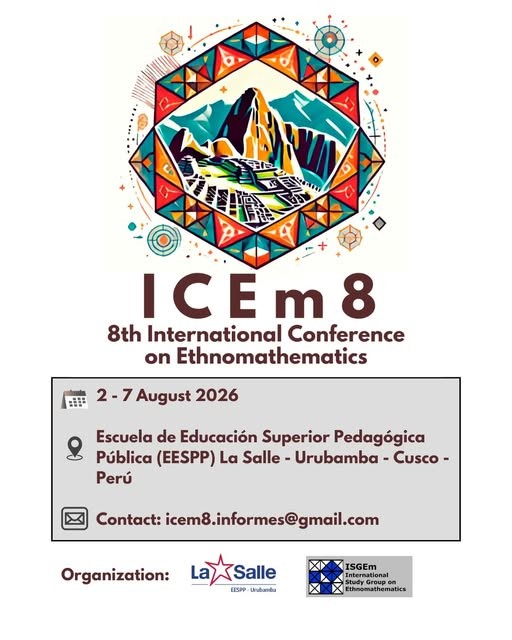
In August 2020, we restarted the publication of the ISGEm Newsletter, and we are also continuing to update the ISGEm website.We are also keeping the original ISGEm goal of publishing two issues of the Newsletter a year: the first one in May and the second one in November, as originally conceived in 1985.

If you would like to participate in the ISGEm Newsletter, we invite you to send your contribution in English, Portuguese, or Spanish by April 30, 2025, to be considered for publication in the next issue in May 2025.
Contributions may be related to: articles (2-pages maximum), book reviews, information about conferences, study groups, ongoing research, meetings, journals, and others (1-page maximum) that are related to investigations in ethnomathematics and the cultural aspects of mathematics. Submissions and correspondence can be sent to: .
12. News from ICMI Country representatives
France
News from France – International Conference in the honor of Guy Brousseau
July 7-10, 2025, at the University of Bordeaux (France)
Stéphane Vinatier, president of CFEM, French ICMI Subcommission.
Anne-Cecile Mathe, Chair of the IPC
Viviane Durand-Guerrier, co-chair of the IPC
Lalina Coulange, chair of the LOC
Marie-Line Chabanol, co-chair of the LOC

The death of Guy Brousseau on February 16, 2024, was a major event for the mathematics didactics research community and, more generally, for the world of mathematics education and those involved in it. Based on the initiative of the ARDM (Association for Research in Didactics of Mathematics), the ADIREM (Assembly of Directors of Research Institutes on the Teaching of Mathematics), and the CFEM (the French sub-commission of the ICMI) and driven by a collegial effort, a conference will be organized from July 7-10, 2025, at the University of Bordeaux (France) to pay tribute to our eminent colleague and to the influence of his pioneering work.
The aim of this conference is, on the one hand, to share the decisive role played by Guy Brousseau and the theory of didactic situations in numerous institutions, associations, and actions for schools and the teaching of mathematics at the local level, in the national and international research community, and among teachers and teacher trainers. This conference also aims to show the living nature of the theory of didactical situations in mathematics. It will provide a forum for reflection on the ways in which its foundations, concepts, and methodological tools continue to inform much of the research into the didactics of mathematics and, more generally, educational research in France and throughout the world. Four themes will be addresses during the conference:
- Theme 1: From the mathematization process to the theory of didactic situations: COREM, a methodological and epistemological instrument for the theory of didactical situations
- Theme 2: The Theory of Didactical Situations in current research: developments and live questions
- Theme 3: Didactical Situation Theory and the professional development of teachers
- Theme 4: The international influence of Guy Brousseau’s work
The language of the conference is French; however, some of the talks will be given in English.
For more information on the conference, please visit the conference website.
Guy Brousseau received the first Felix Klein award of the ICMI in 2003, and a unit is dedicated to his work in the frame of the AMOR project.
Germany
News from Germany – Establishing the nationwide research-based mathematics professional development program QuaMath
Susanne Prediger, Christoph Selter, Bettina Rösken-Winter, Annett Kreuziger, Svea Hallemann, Daniela Götze, Lars Holzäpfel, Hans Anand Pant, & Jürg Kramer
In 2011, the German Center for Mathematics Teacher Education (DZLM) was established to develop mathematics-specific research-based professional development (PD) structures and programs. Twelve universities and 25 professors in mathematics education have engaged to create a national coherence and to cooperate with ministries and PD institutions of 16 federal states in Germany (Roesken-Winter et al., 2021). Since 2021, the DZLM has been adopted into the IPN Leibniz Institute for Science and Mathematics Education.
After 11 years of preparation, we launched QuaMath (“Developing Quality of Mathematics Classrooms and Teacher PD”), the nationwide PD implementation program running from 2022 to 2033. Its aim is to strengthen mathematics competences of K–13 students, to promote mathematics teacher expertise, and to develop the quality of mathematics instruction and of mathematics teacher PD for 10,000 schools (Prediger & Selter, 2024).
Figure 1 presents the implementation structure with three strategies in which we engage to initiate and to substantiate professional learning in schools, with teacher PD in school networks (TPD program), and in a facilitator professional development (FPD program). Together with experienced facilitators, we have developed a catalogue of 27 modules for different age levels and PD content areas. Some modules address overarching PD content such as the use of digital media, problem solving, or language-responsive mathematics teaching; others address mathematical content areas such as numbers and operations, geometry, or (linear) algebra (full catalogue in Prediger & Selter, 2024). State coordinators and PD facilitators select from this catalogue to realize a needs-based approach that takes into account different types of schools and regional differences as well as the pedagogical priorities of each federal state. Coherence between these different modules is achieved through a shared vision of high-quality mathematics teaching.
Although the program builds on existing research, further research is needed to generate empirically based explanatory and actionable knowledge about the implementation processes and professional learning processes at the different levels. In particular, the conditions for success and the effects of selected design and content elements of facilitator PD modules, teacher PD modules, and stimulations of teacher cooperation, as well as the adaptation processes that take place at each level, need to be investigated qualitatively and quantitatively.
A more detailed overview of the program is given by Prediger and Selter (2024). This paper also explains how we achieve the balance between adherence to the program agenda and flexibility for context-specific adaptations by (1) creating a coherent conceptual core at each level, (2) establishing it as a shared vision of all actors, and (3) supporting the processes of adaptation by initiating communication about it.
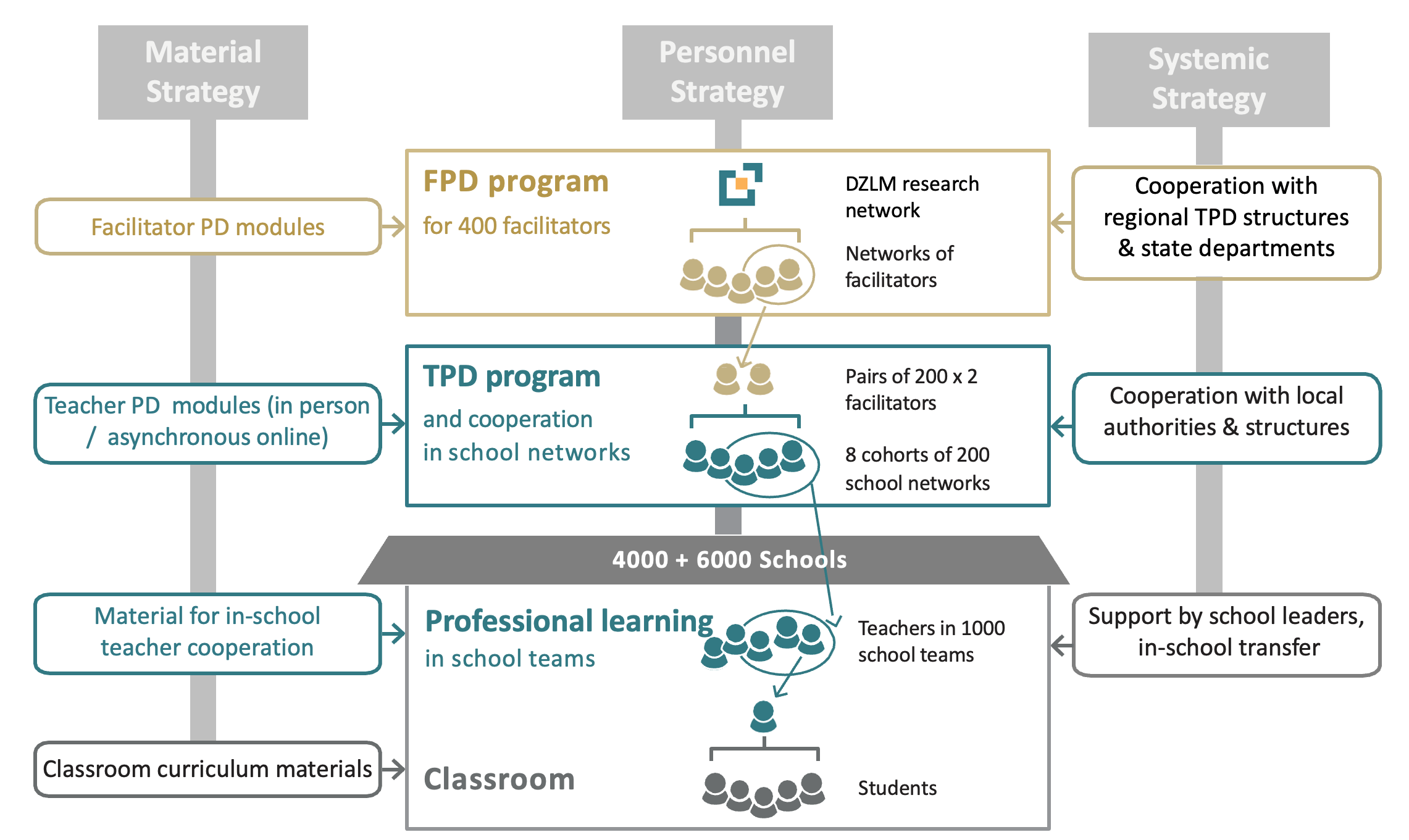
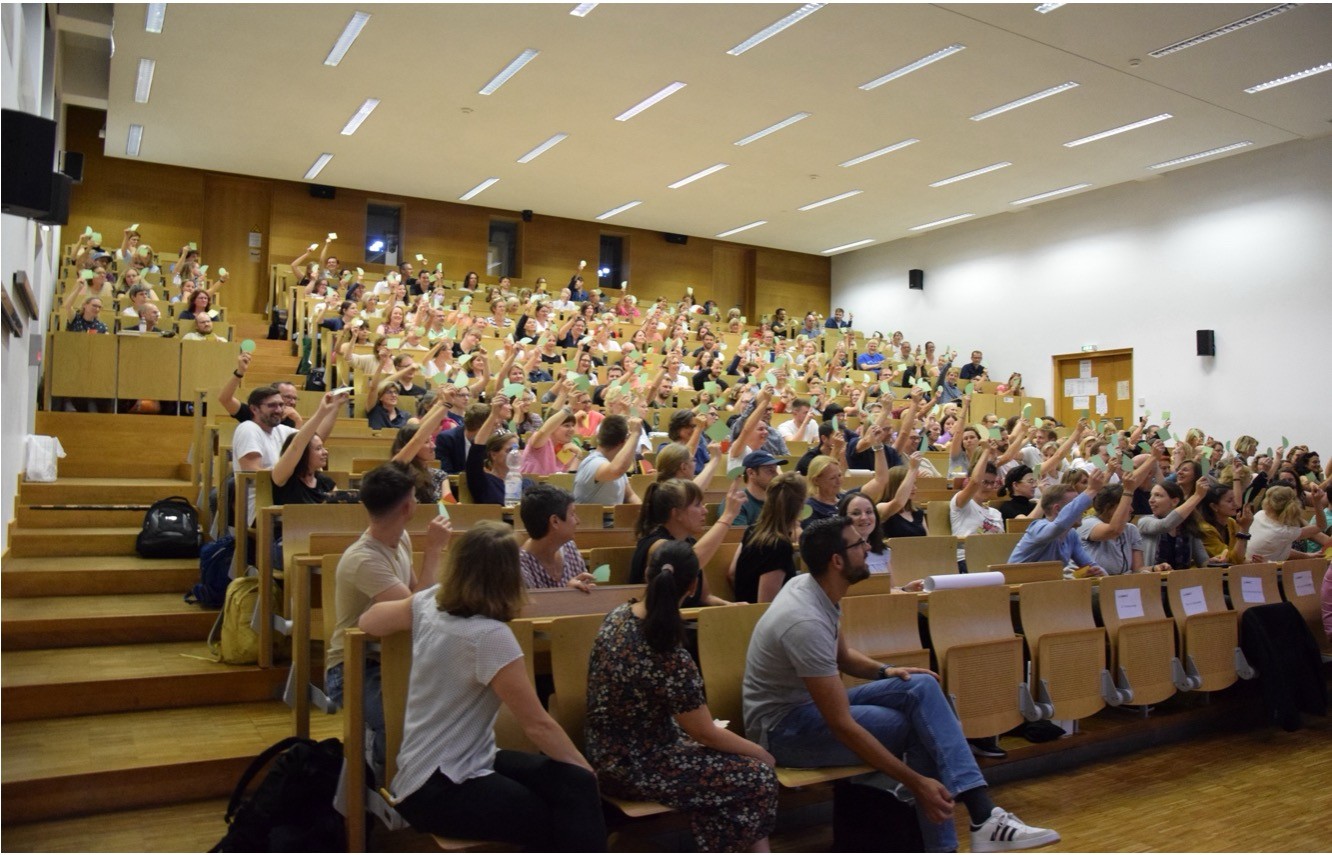
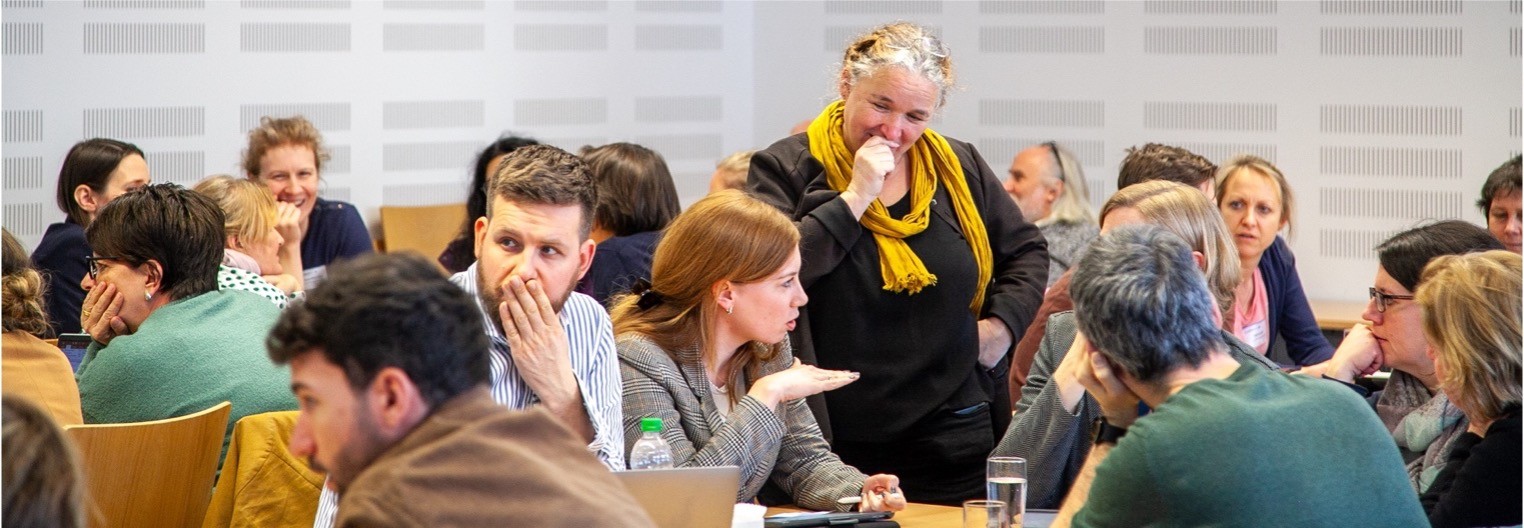
References
Prediger, S. & Selter, C. (2024). Establish shared visions and support productive adaptations on all levels: Aims, strategies, and architecture of a nationwide implementation program. Implementation and Replication Studies in Mathematics Education, 4(1), 15–49. https://doi.org/10.1163/26670127-bja10020
Roesken Winter, B., Stahnke, R., Prediger, S., & Gasteiger, H. (2021). Towards a research base for implementation strategies addressing mathematics teachers and facilitators. ZDM – Mathematics Education, 53(5), 1007–1019. https://doi.org/10.1007/s11858-021-01220-x
Luxembourg
News from Luxembourg - Digital Science – A Pluridisciplinary Approach to Algorithmic Thinking and Creativity
Mike Dostert mike.dostert@education.lu, ICMI Representative for Luxembourg
Luxembourg has introduced a Digital Science course in secondary education to develop problem-solving skills through algorithmic thinking and computational methods. This pluridisciplinary course integrates mathematics, computer science, data analysis, robotics, and artificial intelligence. With a strong focus on programming, creativity, and critical thinking, it prepares students for an increasingly digital world.
The course builds computational thinking on a foundation of mathematical reasoning. Students learn to break down problems, structure algorithms, and implement them in code. By translating mathematical concepts into computational solutions, they enhance their pattern recognition, abstraction, and algorithmic efficiency—key skills in both mathematics and programming.
The coding aspect encourages experimentation, iteration, and optimization, similar to refining a mathematical proof. Programming languages become tools for solving real-world problems, including data analysis, simulations, and artificial intelligence applications.
Beyond mathematics and programming, the course incorporates game theory, robotics, and AI, promoting an interdisciplinary approach. Through project-based learning, students tackle collaborative problem solving in areas like engineering, digital ethics, and automation.
Additionally, the course enhances essential 21st century skills:
- Critical Thinking – Strengthening reasoning, decision making, and cybersecurity awareness.
- Creativity – Encouraging innovation through game design, AI, and robotics.
- Communication – Improving students’ ability to present and document computational solutions.
- Collaboration – Promoting teamwork in coding exercises, group projects, and problem-solving challenges.
A major innovation is its competency-based assessment model, replacing traditional grades with digital badges. This method aligns with modern mathematics didactics, focusing on practical application and mastery over memorization. Badges certify competencies in coding, data analytics, robotics, and AI, representing real-world skills. Luxembourg’s Digital Science course provides a modern approach to integrating mathematics, computational thinking, and digital problem solving. By fostering creativity, communication, collaboration, and critical thinking, it ensures students are innovators and problem solvers. With its project-based methodology and competency-based evaluation, it offers a model for interdisciplinary STEM education, equipping students with essential skills for the digital future.
Poland
News from Poland – XXXIII National Conference of SNM (the Association of Mathematics Teachers) – Mathematics of the Future
Edyta Juskowiak, ICMI Country representative for Poland
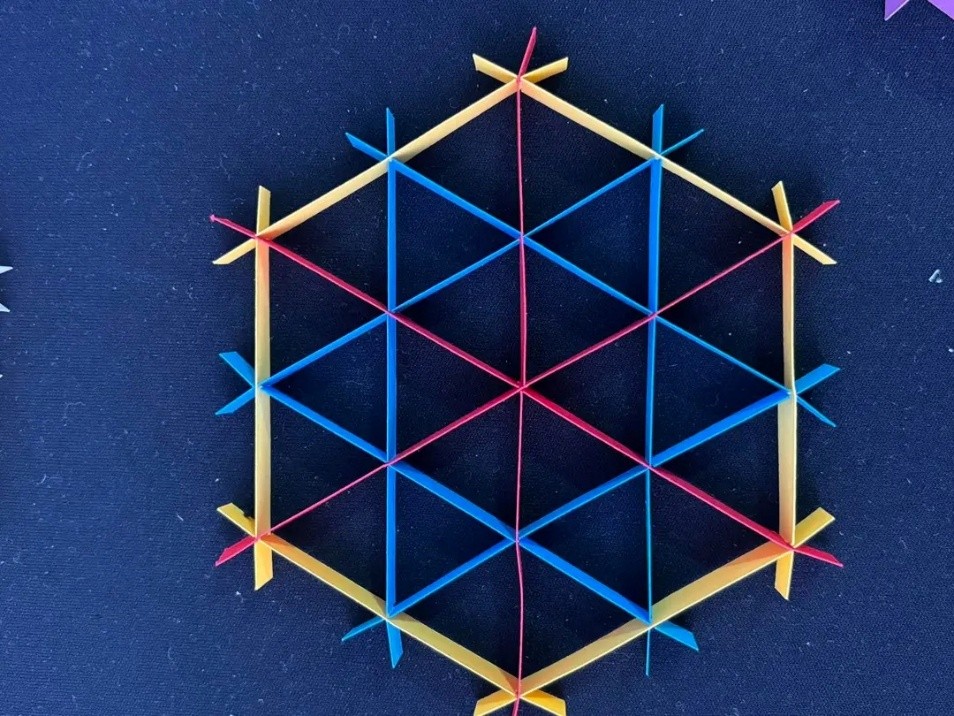
For over three decades, the Polish Association of Mathematics Teachers has been supporting educators in improving teaching methods and promoting modern educational solutions. This year's XXXIII National Conference of SNM, held on February 21-24, 2025, in Szczecin, brought together over 800 mathematics teachers from across Poland. The event served as a platform for inspiring debates, workshops, and lectures led by distinguished experts in mathematics education.
Key Topics of the Conference
The conference provided an opportunity for in-depth analysis of the most important issues related to mathematics education. Discussions covered topics such as the national curriculum, modern technology in education, effective teaching methods, and the well-being of teachers and students. Two debates were particularly engaging: The first focused on the future of mathematics education in Poland, whereas the second explored the role of technology in teaching mathematics, including the potential introduction of scientific calculators in the extended-level matura exam.
Inspiring Lectures
The first day of the conference began with a ceremonial opening at the Prof. Skoczowski Auditorium at the West Pomeranian University of Technology. Following speeches by invited guests, participants attended the keynote lecture How to Overcome Barriers in Mathematics? delivered by Prof. Małgorzata Makiewicz (APS, USz). Subsequent plenary sessions featured esteemed experts:
- Prof. Maciej Jakubowski (IBE, Instytut Badań Edukacyjnychy, Institute of Educational Research ) – Mathematics Teaching and Teacher Training Based on Scientific Research
- Dr. Tomasz Gajderowicz (IBE, Instytut Badań Edukacyjnychy, Institute of Educational Research )) – Graduate Profiles and Changes in the Curriculum
- Prof. Jacek Stańdo (PŁ, Politechnika Łódzka, Łódź University of Technology) – Why Do We Assess Instead of Teach? How Modern Technologies Support the Process of Learning Mathematics
- Prof. Edyta Juskowiak (UAM, Uniwersytet im. Adama Mickiewicza w Poznaniu, Adam Mickiewicz University in Poznań) – Mathematics as a Tool for Developing Future Competencies
- Dr. Anna Pyzara (UMCS, Maria Curie-Skłodowska University) – Where is Mathematics Didactics Headed?
Discussion Panels and Key Issues Addressed
Two major debates addressed crucial aspects of mathematics education in Poland:
- The Future of Mathematics Education – Are we teaching mathematics for its own sake or just for exams? What will mathematics education look like in 2030? Participants presented various perspectives and viewpoints. The consensus was that although mathematics itself will remain unchanged, teaching methods must evolve. The Association of Mathematics Teachers emphasized the importance of evidence-based teaching strategies.
- Technology in Mathematics Education – This debate covered the use of AI, calculators, and educational applications. In Poland, only basic calculators are currently allowed in the Mathematics Matura Examination. A representative from the Central Examination Board (CKE) suggested that in the near future, scientific calculators might be permitted on the extended-level exam. However, this would require thorough preparation of both the examination system and teachers.
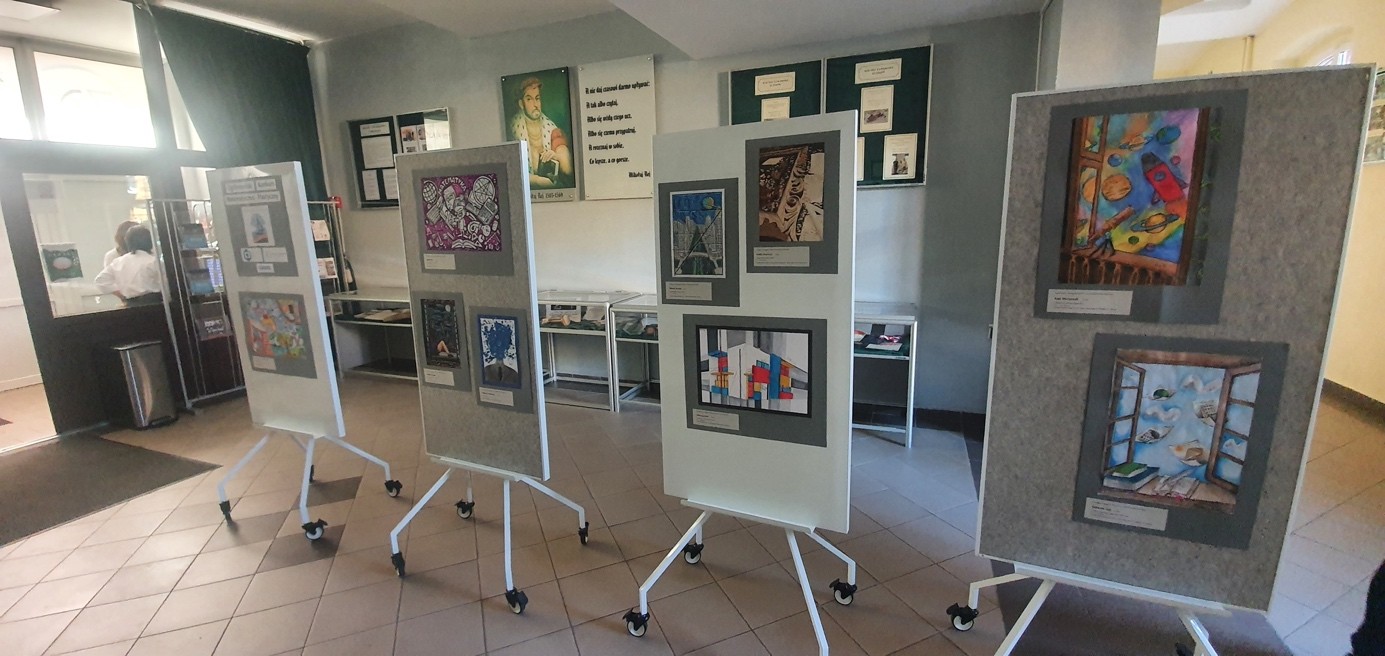
Networking and Accompanying Events
After intensive days filled with discussions, participants had the opportunity to relax and network. The organizers arranged evening attractions, including a concert by the Appassionato Quartet; creative workshops; and discussion panels on the future of mathematics education.
The XXXIII National Conference of SNM proved that mathematics is not only a rigorous science but also a space for creative exploration and pedagogical innovation. This year’s event highlighted the importance of teacher training based on the latest research and the adaptation of teaching methods to a changing world. The next edition of the conference is already planned for next year—we eagerly await another inspiring gathering!
South Africa
News from South Africa - Association for Mathematics Education of South Africa (AMESA) Regional Activities
Dr VG Govender - South Africa Country Representative
AMESA consists of nine regions (which are the provinces of South Africa). Each region plans a series of activities which usually take place prior to our National Congress. Two of the regions have the following activities planned:
- Limpopo:
- Limpopo Regional Mathematics Olympiad: March 10, 2025
- North-West
- International Mathematics Day Celebrations on March 14, 2025 in Education Districts
- North-West Regional Conference on April 26, 2025 (venue to be confirmed): Theme: Mathematics, Art and Creativity.
AMESA National Congress
The 30th AMESA National Congress will take place at the University of Limpopo, in Polokwane, Limpopo from June 30 - July 4, 2035. The theme is Envisioning Equitable Mathematics Education: Promoting relevance and engagement. For more details visit the official AMESA National Congress website.
South African Mathematics Olympiad (SAMO)
The South African Mathematics Olympiad (SAMO) consists of three rounds. The first round of the South African Mathematics Olympiad takes place on March 14, 2025. There are two categories, the junior for Grades 8 and 9 students and the senior for Grades 10-12 students. It is expected that at least 60,000 students from South Africa and other African countries will take part in the first round of SAMO. The second round is scheduled for May 15, 2025, and the third round is on July 31, 2025. For more details, please visit the official SAMO website.
South African Mathematics Challenge (SAMC)
The South African Mathematics Challenge (SAMC) is a competition for primary school students in South Africa. There are separate papers for Grade 4, Grade 5, Grade 6, and Grade 7. The first round is written from March 11-13, 2025. The second round is on May 22, 2025, and the third round is on September 12, 2025. It is expected that at around 70,000 students from South Africa and other African countries will take part in the first round of SAMC 2025. For more details, please check the link go to the official SAMC website.
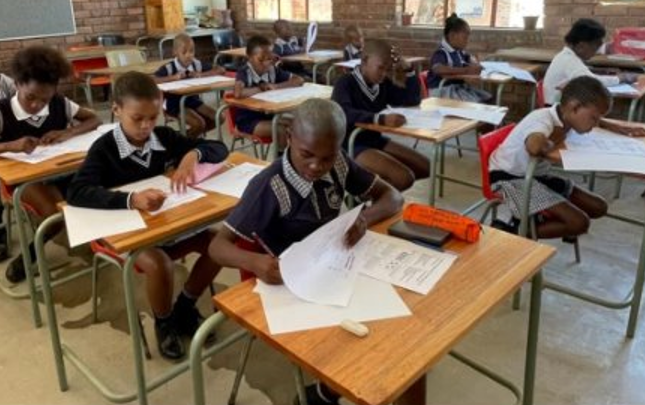
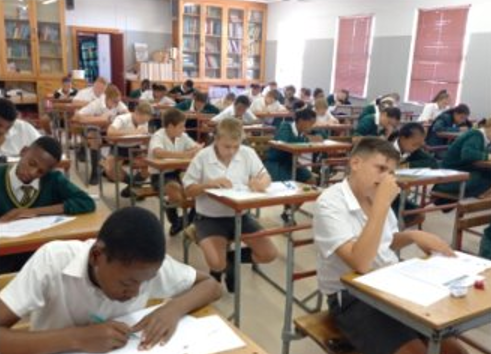
13. Conferences to come
International Society for Design and Development in Education - ISDDE
Dates: May 19-22, 2025
Lcoation: University of Galway, Ireland
More information on the website.
l'Espace Mathématique Francophone (EMF 2025)
Dates: May 26 - 30, 2025
Locartion: Montréal, Canada
More information on the website.
International Group for Mathematical Creativity and Giftedness- (MCG) 14th conference
Dates: on June 16 - 18, 2025
Location: Karlstad, Sweden
More information on the website.
Congresso Iberoamericano de Educação Matemática (X CIBEM)
Dates: 7 - 11 July 2025
Location: Guadalajara, Mexico
More information on the website.
AFRICME-7
Dates: 15 - 18 July 2025
Location: University of Witwatersrand, Johannesburg, South Africa
More information in the announcement.
9th ICMI-East Asia Regional Conference on Mathematics Education (EARCOME 9)
Dates: July 18-22, 2025
Location: Seoul National University, Siheung Campus, Korea,
The theme of the conference is “RE: Visiting the Essence of Mathematics Education in the Era of Digital Transformation.
More information on the website.
Annual Conference of the International Group for the Psychology of Mathematics Education (PME)
Dates: PME 48, July 28 - August, 2, 2025
Location: Santiago, Chile
More information on the website.
International Conference on the Teaching of Mathematical Modelling and Application- ICTMA-22
Dates: August 10 - 15, 2025
Location: Sweden at Linköping University
More information on the website.
IV Congreso de Educación Matemática de América Central y El Caribe (IV CEMACYC)
Dates: November 2-7, 2025
Location: Santo Domingo, Domenican Republic
More information on the website.
World Federation of National Mathematics Competitions - WFNMC-10
Dates: 2026 (Date tbc)
Location: Kuala Lumpur, Malaysia
More information on the website.